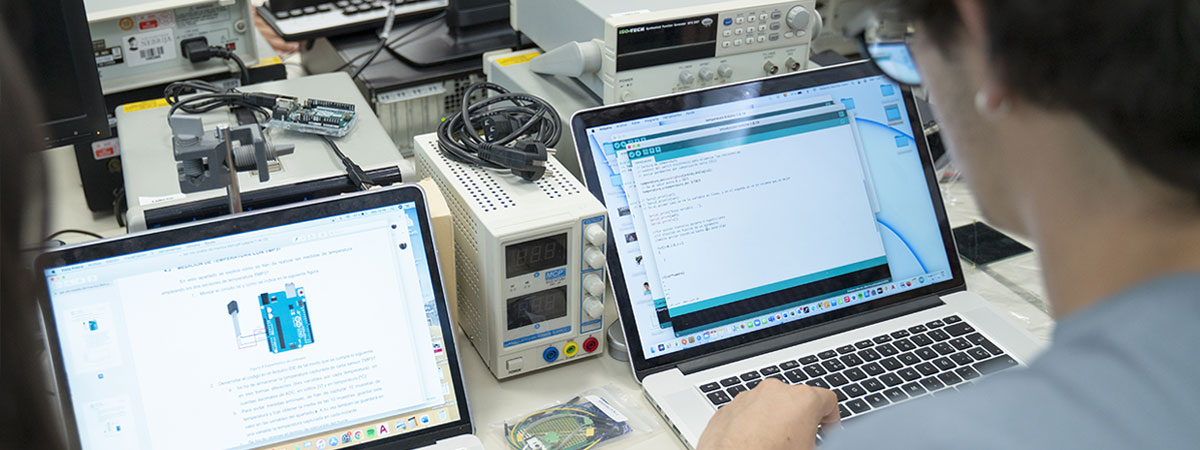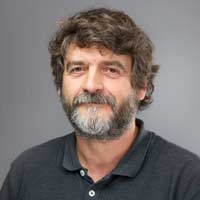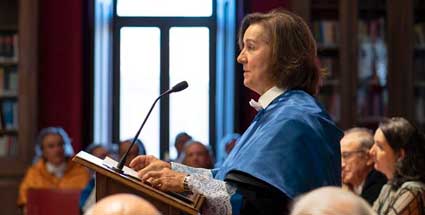Bachelor's Degree in Industrial Technology Engineering

You will complement your Bachelor's Degree with a specialized Diploma
The Bachelor's Degree in Industrial Technologies Engineering is characterized by multidisciplinary training in different areas of industrial technology, such as mechanics, electronics, materials, energy, computing, manufacturing, and information and communication technologies, among others. The Bachelor's Degree in Industrial Technologies Engineering therefore provides the student with a global vision of the industrial field. In addition, the degree introduces the technical and organizational fundamentals of the Smart industry, in whose processes different technologies are integrated, paying special attention to the environment and sustainability. The possibility of taking part of the studies abroad, and contact with industrial companies provides flexibility and adaptability to opt for a wide range of professional profiles.
The curriculum was designed from a transversal point of view, with the aim of developing student skills in various technologies and sectors. Under this premise, students will complete their Bachelor's Degree with a specialization Diploma, where they will be able to choose between Digital Industry, Business Analytics and SAP.
The Diploma in Digital Industry takes place during the first three years of the Bachelor's Degree and addresses concepts such as the digital transformation of production, cybersecurity, robotics and artificial intelligence. For its part, the Diploma in Business Analytics takes place from the second to the fourth year of the degree, and its main objective is to prepare students for the company of the future, providing them with critical thinking that allows them, through technology, to find that differentiating element in the data. On the other hand, the Diploma in SAP for Operations and Logistics aims to provide students with advanced knowledge of navigation and use at an analytical and information management level the SAP ERP tool.
Read +At the end of the Bachelor's Degree, the graduate will be able to develop professionally in many sectors (industrial, energy, aeronautical, consulting, banking...) performing tasks, among others, in equipment production, engineering projects, production control, technical consulting, and research and development. In addition, the Bachelor's Degree in Industrial Technologies Engineering prepares students to obtain the Master's Degree in Industrial Engineering that grants full legal ability of membership and signing off on projects. With the aim of providing the student with the best professional profile, the Higher Polytechnic School of Nebrija University is launching an innovative program that combines this Master's Degree in Industrial Engineering with an MBA + Expert in Technology Management.
Read Less
Alongside the Professional Association of Industrial Engineers of Madrid (COIIM)
Nebrija University has established a collaboration agreement with the Professional Association of Industrial Engineers of Madrid. This partnership enables students and graduates to engage with the association, participating in research endeavors, events, thematic conferences, seminars, and the COIIM-organized Congress (CIBITEC). It also facilitates direct interaction with industry professionals, offering valuable firsthand insights into the profession.
A quality multidisciplinary education complemented with international mobility
Curriculum
BOE No. 68, of March 21, 2011
All our degrees and curricula have been prepared in accordance with the new guidelines set by current legislation, having already been verified by the National Agency for Quality Assessment.
The student must complete 240 credits
First year 60 ECTS
First Semester 30 ECTS- 6 ECTS | Mathematics I
- 6 ECTS | Calculus I
- 6 ECTS | Physics I
- 6 ECTS | Graphic Expression I
- 6 ECTS | Fundamentals of Computer Science
Second Semester 30 ECTS- 6 ECTS | Mathematics II
- 6 ECTS | Calculus II
- 6 ECTS | Graphic Expression II
- 6 ECTS | Physics II
- 6 ECTS | Chemistry
Second year 57 ECTS
First Semester 27 ECTS- 6 ECTS | Circuits
- 6 ECTS | Fundamentals of Materials Science
- 6 ECTS | Statistics
- 6 ECTS | Automatic Regulation
- 6 ECTS | Mechanics
Second Semester 30 ECTS- 6 ECTS | Electric machines
- 6 ECTS | The Company and its Environment
- 6 ECTS | Electromagnetism and Fields and Waves
- 6 ECTS | Thermodynamics
- 6 ECTS | Lead I
Third year60 ECTS
First Semester 35 ECTS- 6 ECTS | Electronics
- 6 ECTS | Material resistance
- 6 ECTS | Thermal Engineering
- 6 ECTS | Fluid mechanics
- 6 ECTS | Machine Theory
Second Semester 24 ECTS- 6 ECTS | Materials Engineering
- 6 ECTS | Fluid-mechanical Systems and Machines
- 6 ECTS | IT and Communications
- 6 ECTS | Lead II
Fourth year 63 ECTS
First Semester 33 ECTS- 6 ECTS | Industrial processes
- 6 ECTS | Instrumentation and Industrial Computing
- 6 ECTS | Projects
- 6 ECTS | Chemical engineering
- 3 ECTS | Business Management and Organization
- 6 ECTS | Eval. of the Development of Skills in the Company
Second Semester 30 ECTS- 6 ECTS | Digital systems
- 6 ECTS | Environment and Sustainability
- 6 ECTS | Calculation, Design and Testing of Machines
- 12 ECTS | Final Research Project
More information on these subjects
- 6 ECTS | Lidera I
- 6 ECTS | Lidera II
The recognition of 6 credits will be arranged according to the different activities that the student carries out throughout his/her degree. They will be awarded for university cultural activities, sports, student representation, solidarity and cooperation, and/or for attending one of the following subjects: Human Rights and Corporate Social Responsibility.
A program whose objective is to favor the practical training of the students, under the continuous supervision of the Department of Professional Careers of the University, the academic department corresponding to the degree and the company or collaborating institution where the internships are carried out. We provide advice on the choice of internships and follow-up and tutoring, always taking the student’s professional orientation into account.
More information on Internships in Companies List of companies and institutions where the students of the degree have carried out internships under an educational cooperation agreementThis project involves the development of research tasks regarding different subjects by the student under the advice of one or several professors of the Department and, occasionally, professionals from the business world. For this, the student has the possibility to choose a project from among those offered.
Nebrija University, which is committed to languages and quality, provides the student with added value with the Diploma in English Professional Communication, which will allow him/her to achieve with confidence the competence demanded to successfully join the labor market.
It corresponds to level C1.
More information hereDiploma in Digital Industry
The student will be able to complement his Degree with the Diploma in Digital Industry and specialize in concepts related to industry 4.0, robotics, cybersecurity or digital manufacturing and design.
Plan de Estudios del Diploma en Industria Digital
Primer curso 8 ECTS
- Primer Semestre
- 3 ECTS | Fabricación y Diseño Digital
Segundo Semestre- 2 ECTS | Talleres de Fabricación Avanzada
- 1 ECTS | Taller Programación Python para Control Industrial
- 1 ECTS | Talleres de Simulación
- 1 ECTS | Taller de Control de Sistemas
Segundo curso 8 ECTS
- Primer Semestre
- 2 ECTS | Transformación Digital de la Producción
- 2 ECTS | Transformación Digital de la Logística
Segundo Semestre- 2 ECTS | Redes Industriales y Ciberseguridad
- 2 ECTS | Automatización en la Industria 4.0
Tercer curso 8 ECTS
- Primer Semestre
- 4 ECTS | Aplicaciones Industriales de la Inteligencia Artificial
Segundo Semestre- 2 ECTS | Simulación 3D y Optimización de Procesos Productivos
- 2 ECTS | Robótica Industrial
Diploma in Business Analytics
The student can choose the Diploma in Business Analytics as a complement to his Degree and specialize in data analysis and its direct application to the business world.
Plan de Estudios del Diploma en Business Analytics
Segundo curso 8 ECTS
- Primer Semestre
- 4 ECTS | Fundamentos de la Programanción
Segundo Semestre- 4 ECTS | Diseño de Algoritmos
Tercer curso 8 ECTS
- Primer Semestre
- 4 ECTS | Base de datos y recuperación de la Información
Segundo Semestre- 2 ECTS | Arquitectura / Big Data
- 2 ECTS | Fundamentos de la Analítica de los Negocios
Cuarto curso 8 ECTS
- Primer Semestre
- 3 ECTS | Diseño de Casos de Uso
- 2 ECTS | La Estrategia Empresarial
Segundo Semestre- 3 ECTS | Indicadores de Negocio - Cuadro de Mando
Diploma in SAP for Operations and Logistics
Students can choose the Diploma in SAP for Operations and Logistics as a complement to their Bachelor's Degree. The objective of the Diploma is to provide the student with advanced knowledge of navigation and use at the analytical and information management level of the SAP ERP tool.
SAP is undoubtedly the ERP par excellence, and whoever has knowledge of it will enhance their employability in the national and international market.
The diploma was designed with a high practical component, which is what companies are looking for in the end, and facilitating students to have a practical experience similar to the real world. During the different subjects - through a case study that serves as a common thread - the student will assume different roles within the company and will learn in a practical way the processes of a company and how they are reflected in SAP.
Curriculum of the Diploma in SAP for Operations and Logistics
Second year 12 ECTS
- First Semester
- 6 ECTS | Introduction SAP ERP: Logistics and relations with Finance
Second Semester- 6 ECTS | ERP SAP: Production processes and Reporting
Third year 12 ECTS
- First Semester
- 6 ECTS | ERP SAP: Maintenance management
Second Semester- 6 ECTS | ERP SAP. Warehouse and Quality Management
Access to the Master in Industrial Engineering
Graduates in Engineering in Industrial Technologies have:
- Direct access to Master's Degree in Industrial Engineering, which confers upon completion all the professional powers of Industrial Engineers, which are included in the Royal Decree of September 18, 1935, published in the Madrid Gazette No. 263 of September 20, 1935.
- Direct Access to the Master's Degree in Industrial Engineering + Master in Management, that trains the new industry leaders in the 21st century. This is a pioneering program in our country that integrates engineering, technology and business, in practical training from day one. The Master's Degree in Industrial Engineering qualifies for the profession of Industrial Engineer in accordance with current legislation, expanding this training with the MIM, combining engineering and business in a multidisciplinary study plan that enables them to lead any industrial project in an international environment.
Nebrija Clubs
Students can get involved from day one in specific projects.
That allow you to complement your theoretical training with activities in which you can make your projects come true.
Specialization Diplomas from the Higher Polytechnic School
Our program offers the unique opportunity to integrate Specialization Diplomas, enabling students to enhance their education and increase their prospects with leading companies, both nationally and internationally, within their respective sectors.
We deliver our courses in a flexible hybrid format, blending face-to-face and online instruction. This approach allows students to conveniently balance their coursework with their studies.
Professors
| Profesores Professors | Porcentaje de Doctores Percentage of PhD holders |
| 48 | 58% |
Profesores
Professors
 Jorge González de la Fuente
Director del Grado en Ingeniería en Tecnologías Industriales
Jorge González de la Fuente
Director del Grado en Ingeniería en Tecnologías IndustrialesProfesor del área de Ingeniería Eléctrica y Electrónica Director of the Bachelor's Degree in Industrial Technology Engineering
Professor of the area of Electrical and Electronic Engineering Ingeniero Industrial Superior por la Universidad de Valladolid, certificado en Project Management por el Project Management Institute, Coach profesional por ASESCO, Mentor profesional con más de 5 años de experiencia con jóvenes universitarios en sus procesos de incorporación al mercado laboral, emprendedor y fundador de NextPlay, empresa del sector educativo con una solución que permite que los jóvenes alumnos reciban una orientación formativo-laboral adecuada a sus necesidades, con casi 20 años de experiencia internacional en puestos de responsabilidad como Consultor, Project Manager, Key Account Manager y Director Comercial en los sectores de Automoción, Logística, Alimentación y Metalurgia.
 Roberto Álvarez Fernández
Director del Departamento Escuela de Ingeniería Industrial
Roberto Álvarez Fernández
Director del Departamento Escuela de Ingeniería IndustrialDirector de Trabajos Fin de Grado Director of the School of Industrial Engineering Department
Director of Final Degree Projects Doctor en Ingeniería Industrial especialidad en Ingeniería de los procesos de fabricación. Ingeniero Industrial especialidad en electrotecnia y especialidad en organización de la producción. Profesor acreditado en las figuras de contratado doctor y profesor de universidad privada. 22 años de experiencia docente y 14 años de experiencia investigadora. Cuenta con dos sexenios de investigación, más de 1400 citas en Google Scholar Citations, 24 artículos en revistas indexadas en el JCR (Journal Citations Reports) de los cuales 15 corresponden al primer cuartil (Q1). Ha publicado dos libros con la editorial Springer y numerosos capítulos de libros, participaciones en congresos y charlas, tanto nacionales como internacionales. Su línea de investigación se centra en la sostenibilidad en el uso de las infraestructuras urbanas y el consumo de energía, incluyendo la actividad industrial, la movilidad y la cuantificación de las emisiones de gases de efecto invernadero debida a dichas actividades.
 Adrián Altamira Peña
Profesor del área de Expresión Gráfica
Professor of the Graphic Expression area
Graduado en Ingeniería Mecánica e Ingeniería en Diseño Industrial y Desarrollo de Productos por la Universitat Politècnica de València. Máster en Ingeniería de Vehículos de Competición por la Universidad Nebrija. Máster en Ciencia e Ingeniería de Materiales por la Universidad Carlos III. Doctorando en el programa de Ingeniería Mecánica y Organización Industrial en la Universidad Carlos III.
Profesor del área de Expresión Gráfica desde el curso 22-23 en la Universidad Nebrija.
Experiencia como ingeniero en el sector automotriz desde 2022 en la Universidad Nebrija. Especialmente en el desarrollo de carrocerías de materiales compuestos para vehículos de altas prestaciones, como el proyecto Nebrija to Dakar, entre otros.
Adrián Altamira Peña
Profesor del área de Expresión Gráfica
Professor of the Graphic Expression area
Graduado en Ingeniería Mecánica e Ingeniería en Diseño Industrial y Desarrollo de Productos por la Universitat Politècnica de València. Máster en Ingeniería de Vehículos de Competición por la Universidad Nebrija. Máster en Ciencia e Ingeniería de Materiales por la Universidad Carlos III. Doctorando en el programa de Ingeniería Mecánica y Organización Industrial en la Universidad Carlos III.
Profesor del área de Expresión Gráfica desde el curso 22-23 en la Universidad Nebrija.
Experiencia como ingeniero en el sector automotriz desde 2022 en la Universidad Nebrija. Especialmente en el desarrollo de carrocerías de materiales compuestos para vehículos de altas prestaciones, como el proyecto Nebrija to Dakar, entre otros.
 Sergio Ávalos Legaz
Profesor del área de Fundamentos de Informática
Professor of the Computer Fundamentals area
Graduado en Ingeniería de Telecomunicaciones y Máster en Ingeniería de Sistemas Electrónicos por la Universidad Politécnica de Madrid.
Durante los últimos años como alumno en la Universidad, centró su investigación en la implementación de redes neuronales en FPGAs.
Dio sus primeros pasos en el sector privado de la mano de Altran, donde trabajó como becario durante seis meses, en el Departamento de I+D. Actualmente es Ingeniero Firmware en SENER Aeroespacial, donde desarrolla sistemas digitales basados en FPGA para proyectos en el sector espacio.
Sergio Ávalos Legaz
Profesor del área de Fundamentos de Informática
Professor of the Computer Fundamentals area
Graduado en Ingeniería de Telecomunicaciones y Máster en Ingeniería de Sistemas Electrónicos por la Universidad Politécnica de Madrid.
Durante los últimos años como alumno en la Universidad, centró su investigación en la implementación de redes neuronales en FPGAs.
Dio sus primeros pasos en el sector privado de la mano de Altran, donde trabajó como becario durante seis meses, en el Departamento de I+D. Actualmente es Ingeniero Firmware en SENER Aeroespacial, donde desarrolla sistemas digitales basados en FPGA para proyectos en el sector espacio.
 Alberto Avecilla García
Profesor del área de materiales
Professor of the materials area
Ingeniero industrial. Executive MBA por el IE Business School y profesor, con 20 años de experiencia en diferentes sectores. En consultoría digital, es experto en la puesta en marcha e implementación de proyectos en las áreas de innovación y transformación digital: gemelo digital, plataforma digital para el seguimiento y análisis de proyectos y activos, análisis predictivo, sensorización y geolocalización de maquinaria en lugares complejos como túneles y un proyecto medioambiental (ESG) para darle una segunda vida a los materiales. En los sectores de industria, construcción y logística (en empresas como Albatros, FCC, OSSA y Sacyr) ha desarrollado proyectos de gestión de activos de vehículos y maquinaria con multitud de países, siendo responsable de toda la cadena de valor (compra, mantenimiento y maximización de la vida útil, logística y desinversión).
Alberto Avecilla García
Profesor del área de materiales
Professor of the materials area
Ingeniero industrial. Executive MBA por el IE Business School y profesor, con 20 años de experiencia en diferentes sectores. En consultoría digital, es experto en la puesta en marcha e implementación de proyectos en las áreas de innovación y transformación digital: gemelo digital, plataforma digital para el seguimiento y análisis de proyectos y activos, análisis predictivo, sensorización y geolocalización de maquinaria en lugares complejos como túneles y un proyecto medioambiental (ESG) para darle una segunda vida a los materiales. En los sectores de industria, construcción y logística (en empresas como Albatros, FCC, OSSA y Sacyr) ha desarrollado proyectos de gestión de activos de vehículos y maquinaria con multitud de países, siendo responsable de toda la cadena de valor (compra, mantenimiento y maximización de la vida útil, logística y desinversión).
 Joseba K. Azcaray Fernández
Director del Máster en Diseño Industrial y del Grado en Ingeniería en Diseño Industrial y Desarrollo del Producto / Director de Trabajos Fin de Grado
Director of the Master's Degree in Industrial Design and the Degree in Engineering in Industrial Design and Product Development / Director of End of Degree Projects
Doctor Internacional con mención Cum Laude en diseño, fabricación y gestión de proyectos industriales por la Universitat Politècnica de València (UPV). Actualmente es director del grado en ingeniería en Diseño Industrial y Desarrollo de Producto y máster de la Universidad de Nebrija especializado en el área de innovación e investigación de proyectos.
Joseba K. Azcaray Fernández
Director del Máster en Diseño Industrial y del Grado en Ingeniería en Diseño Industrial y Desarrollo del Producto / Director de Trabajos Fin de Grado
Director of the Master's Degree in Industrial Design and the Degree in Engineering in Industrial Design and Product Development / Director of End of Degree Projects
Doctor Internacional con mención Cum Laude en diseño, fabricación y gestión de proyectos industriales por la Universitat Politècnica de València (UPV). Actualmente es director del grado en ingeniería en Diseño Industrial y Desarrollo de Producto y máster de la Universidad de Nebrija especializado en el área de innovación e investigación de proyectos.
Ha colaborado en proyectos internacionales en el que destaca la estancia en la universidad de LABA (Italia) con el proyecto de investigación de las nuevas tecnologías creativas aplicadas a la docencia.
Funda en Bilbao el estudio W! design con el proyecto Txikitech, donde desarrollan e investigan la inclusión de metodologías basadas en el diseño en el sistema curricular de la enseñanza a través de las nuevas tecnologías. En él se alcanza el conocimiento de las ciencias, matemáticas, ingeniería, tecnología y el arte (STEAM) desde metodologías del diseño. En la actualidad, la escuela posee entorno 1000 alumnos y expandido en varios puntos. A su vez, dirige un equipo de investigación y desarrollo de producto relacionado con las nuevas tecnologías opensources y fabricación digital.
 Francisco Badea Romera
Profesor del área de Ingeniería Mecánica
Francisco Badea Romera
Profesor del área de Ingeniería MecánicaIP del grupo de investigación Nebrija en Ingeniería de Vehículos (GREEN) Professor of the IP Mechanical Engineering area of the Nebrija research group in Vehicle Engineering (GREEN) Doctor en Ingeniería Mecánica por la Universidad Politécnica de Madrid. Ingeniero de Automóviles por la Universidad Politécnica de Bucarest (2002-2007). Ha realizado dos Máster, uno en Ingeniería Mecánica (Universidad Politécnica de Madrid) y otro en Ingeniería de Automóviles (Universidad de Bucarest). Doctorado en Ingeniería Mecánica (2014) en la Universidad Politécnica de Madrid. Ha sido profesor del Máster en Automoción INSIA-UPM (Vibraciones, análisis modales, harmónicos y transitorios mediante elementos finitos) entre 2010/2015. Su experiencia en investigación ha estado relacionada con el Instituto universitario de investigación del automóvil (Madrid) - 03/2009-12/2014 y con el Georgia Institute of Technology (Atlanta) – 05/2011-09/2011.
 Rafael Barea del Cerro
Coordinador del Programa de Doctorado en Tecnologías Industriales e Informáticas
Rafael Barea del Cerro
Coordinador del Programa de Doctorado en Tecnologías Industriales e Informáticas Profesor del área de Materiales Coordinator of the Doctoral Program in Industrial and Computer Technologies
Professor of the Materials area Doctor por la UAM, Ingeniero de Materiales por la UPM, Licenciado en CC Físicas y Diplomado en Magisterio por la UCM. Especialista universitario en elementos finitos en problemas térmicos por la UNED. Experiencia investigadora durante más de 20 años en diferentes centros del CSIC y en la Universidad Nebrija. Profesor titular por la ANECA, posee tres sexenios de investigación. Especialidades: procesamiento y caracterización de materiales cerámicos y metálicos, en modelos matemáticos y simulación (redes neuronales, lógica difusa, inteligencia artificial, elementos finitos, modelización de propiedades no lineales de materiales...). Actualmente trabajando en el área de fabricación aditiva en inoxidables, en propiedades mecánicas de aleaciones de magnesio y electromagnéticas de perovskitas con orientación a la fabricación de piezas y sensores de la industria del transporte (aviones, trenes, barcos y automóviles).
 Fernando Beltrán Cilleruelo
Profesor del área de Expresión Gráfica
Professor of the area of Graphic Expression
Ingeniero Técnico Industrial por la Escuela Universitaria de Ingeniería Técnica Industrial de Bilbao, (UPV) y Graduado en Ingeniería Mecánica por la Escuela Politécnica Superior de la Universidad Nebrija. Mas de 10 años de experiencia como Project Manager en el campo de la construcción industrial y residencial.
Instructor del módulo MATLAB-Simulink y Catia V5 para el grado de Ingeniería para el Motociclismo de Competición, organizado por la Fundación General de la Universidad Politécnica de Madrid (FGUPM), impartido en la Escuela Técnica Superior de Ingeniería y Diseño Industrial de la UPM (ETSIDI-UPM).
Actualmente, profesor asociado en la Escuela Politécnica Superior de la Universidad Nebrija desde 2017, en las áreas de Expresión gráfica e Ingeniería Eléctrica. Colaboraciones en el área de movilidad sostenible y huella de carbono.
Publicaciones en el área de la movilidad: “A new approach to battery powered electric vehicles: A hydrogen fuel-cell based range extender system”. International Journal of Hydrogen Energy; “Fuel optimization strategy for hydrogen fuel cell range extender vehicles applying genetic algorithms” Renewable and Sustainable Energy Reviews. ELSEVIER. - Otras publicaciones: "Carbon footprint calculator for urban planning in the Community of Madrid", considerada como una de las mejores SUSTAINABILITY ACTIONS 2022 de impacto ambiental y social, en su II Edición. “Measuring to evaluate alternatives: the carbon footprint calculator for urban planning of the Community of Madrid” International Journal Proceedings of Science and Technology, y How does the urban growth in climate change? Ciudad Sostenible 2023.
Accesit en los premios a los trabajos Fin de Grado correspondientes al curso 2014-2015, con el proyecto “Análisis de la influencia de la conducción en la eficiencia e impacto ambiental de un vehículo eléctrico. (MATLAB-SIMULINK)” por el Colegio Oficial de Ingenieros Técnicos Industriales de Madrid.
Fernando Beltrán Cilleruelo
Profesor del área de Expresión Gráfica
Professor of the area of Graphic Expression
Ingeniero Técnico Industrial por la Escuela Universitaria de Ingeniería Técnica Industrial de Bilbao, (UPV) y Graduado en Ingeniería Mecánica por la Escuela Politécnica Superior de la Universidad Nebrija. Mas de 10 años de experiencia como Project Manager en el campo de la construcción industrial y residencial.
Instructor del módulo MATLAB-Simulink y Catia V5 para el grado de Ingeniería para el Motociclismo de Competición, organizado por la Fundación General de la Universidad Politécnica de Madrid (FGUPM), impartido en la Escuela Técnica Superior de Ingeniería y Diseño Industrial de la UPM (ETSIDI-UPM).
Actualmente, profesor asociado en la Escuela Politécnica Superior de la Universidad Nebrija desde 2017, en las áreas de Expresión gráfica e Ingeniería Eléctrica. Colaboraciones en el área de movilidad sostenible y huella de carbono.
Publicaciones en el área de la movilidad: “A new approach to battery powered electric vehicles: A hydrogen fuel-cell based range extender system”. International Journal of Hydrogen Energy; “Fuel optimization strategy for hydrogen fuel cell range extender vehicles applying genetic algorithms” Renewable and Sustainable Energy Reviews. ELSEVIER. - Otras publicaciones: "Carbon footprint calculator for urban planning in the Community of Madrid", considerada como una de las mejores SUSTAINABILITY ACTIONS 2022 de impacto ambiental y social, en su II Edición. “Measuring to evaluate alternatives: the carbon footprint calculator for urban planning of the Community of Madrid” International Journal Proceedings of Science and Technology, y How does the urban growth in climate change? Ciudad Sostenible 2023.
Accesit en los premios a los trabajos Fin de Grado correspondientes al curso 2014-2015, con el proyecto “Análisis de la influencia de la conducción en la eficiencia e impacto ambiental de un vehículo eléctrico. (MATLAB-SIMULINK)” por el Colegio Oficial de Ingenieros Técnicos Industriales de Madrid.
 Antonio Cantero Obregón
Profesor del área de Ingeniería Mecánica
Professor of the Mechanical Engineering area
Doctor por la Escuela Politécnica Superior del E. Máster en Universitario en Ciencia e Ingeniería de Materiales por la Universidad Carlos III de Madrid. Ingeniero T. Industrial por la Universidad Politécnica de Madrid. Ingeniero en Centro de Experimentación relacionado con la balística. Ingeniero de Oficina Técnica, Ingeniero de Programación y Control, Ingeniero de Calidad en un centro de mantenimiento de vehículos especiales.
Profesor de la Universidad Antonio de Nebrija desde 2016. Imparte la asignatura “Calculo Diseño y Ensayo de Máquinas” y ha impartido “Teoría de Máquinas” (Grado). Profesor del Máster en Tecnologías para la Defensa de la Universidad Politécnica de Madrid en el módulo de Plataformas Terrestres. Ha dirigido y dirige distintos Trabajos de Fin de Grado, Formación, Proyectos Fin de Carrera.
Su experiencia en investigación está centrada en la protección de infraestructuras críticas frente a amenazas relacionadas con los impactos y ondas de presión.
Antonio Cantero Obregón
Profesor del área de Ingeniería Mecánica
Professor of the Mechanical Engineering area
Doctor por la Escuela Politécnica Superior del E. Máster en Universitario en Ciencia e Ingeniería de Materiales por la Universidad Carlos III de Madrid. Ingeniero T. Industrial por la Universidad Politécnica de Madrid. Ingeniero en Centro de Experimentación relacionado con la balística. Ingeniero de Oficina Técnica, Ingeniero de Programación y Control, Ingeniero de Calidad en un centro de mantenimiento de vehículos especiales.
Profesor de la Universidad Antonio de Nebrija desde 2016. Imparte la asignatura “Calculo Diseño y Ensayo de Máquinas” y ha impartido “Teoría de Máquinas” (Grado). Profesor del Máster en Tecnologías para la Defensa de la Universidad Politécnica de Madrid en el módulo de Plataformas Terrestres. Ha dirigido y dirige distintos Trabajos de Fin de Grado, Formación, Proyectos Fin de Carrera.
Su experiencia en investigación está centrada en la protección de infraestructuras críticas frente a amenazas relacionadas con los impactos y ondas de presión.
 Juan Carlos Castillo Barranco
Profesor del área de Proyectos
Professor of the Projects area
Doctor Ingeniero de Caminos, Canales y Puertos, Universidad Politécnica Madrid (2002). Experiencia de 33 años principalmente en el diseño y construcción de carreteras liderando durante los últimos 20 años proyectos a gran escala, tanto en España como en el extranjero. Posición actual en Acciona, Executive Technical Leader. Experto en Carreteras de la Unidad de Negocio Especializado de Carreteras y Puentes de Acciona Construcción.
Juan Carlos Castillo Barranco
Profesor del área de Proyectos
Professor of the Projects area
Doctor Ingeniero de Caminos, Canales y Puertos, Universidad Politécnica Madrid (2002). Experiencia de 33 años principalmente en el diseño y construcción de carreteras liderando durante los últimos 20 años proyectos a gran escala, tanto en España como en el extranjero. Posición actual en Acciona, Executive Technical Leader. Experto en Carreteras de la Unidad de Negocio Especializado de Carreteras y Puentes de Acciona Construcción.
 Óscar Castillo Campo
Director del Grado en Ingeniería Mecánica
Óscar Castillo Campo
Director del Grado en Ingeniería MecánicaProfesor del área de Ingeniería Eléctrica y Electrónica Director of the Degree in Mechanical Engineering
Professor in the area of Electrical and Electronic Engineering Doctor en Tecnologías Industriales (Universidad Antonio de Nebrija). Máster en Ingeniería Avanzada de Fabricación (UNED). Ingeniero Industrial Mecánico (UC3M). Responsable del área mecánica de la consultora Vázquez y Torres Ingeniería S. L. durante los últimos diez años y profesor asociado en la Universidad Nebrija durante más de cinco años. Su carrera profesional está vinculada al diseño y fabricación de sistemas mecánicos de alto contenido tecnológico para el sector del automóvil, aeronáutico e infraestructuras industriales, con más de veinte años de experiencia dedicada a la supervisión técnica, organización y gestión de recursos en proyectos interdisciplinares nacionales e internacionales en el sector privado y público (GRUPO ANTOLÍN I+D+I, CENTRO TÉCNICO DE SEAT, VALEO, INTA, Applus+ IDIADA, JOHNSON CONTROLS, ZF-TRW, MAGNA, LEAR, ISRI, EADS, IBERIA, CESA, INTA, CEDEX, ADIF, ...), con participación activa en proyectos europeos (CleanSky y H2020).
 Fernando Chavarri Dicenta
Profesor del área de Empresa
Professor of the Business area
Licenciado en Ciencias Físicas (1966).- Universidad Complutense de Madrid.
Doctor en Ciencias por la Universidad Politécnica de Madrid (2002). 28 años de práctica laboral en Finanzauto S.A, distribuidor en España de Caterpillar (1966-93) como: Director de Delegación (1969-76). Subdirector de Motores (1976-78). Subdirector de Marketing (1978-80). Subdirector de Proceso de Datos (1980-83). Director de Desarrollo (1983-93) (comprende Recursos Humanos y Proceso de Datos).Consejero Delegado de STET, Caterpillar Portugal (1990-93). Miembro del Comité de Dirección (1980 -1993. Profesor Doctor Asociado de la Escuela Técnica Superior de Ingenieros de Telecomunicación (UPM) (1997-2010). Profesor de Estrategia en los Máster MBA y MDSIC de la UPM (1994- ). Profesor de Calidad Total en el Máster MBA de la UPM (1994-). Profesor de Calidad Total de CEPADE. Cofundador y Director del Grupo de Reingeniería Estratégica, consultora integrada en la UPM y especializada en el análisis e implantación del Modelo de Gestión de Calidad total en las empresas, siendo varias las empresas que pueden servir de referencia.
Fernando Chavarri Dicenta
Profesor del área de Empresa
Professor of the Business area
Licenciado en Ciencias Físicas (1966).- Universidad Complutense de Madrid.
Doctor en Ciencias por la Universidad Politécnica de Madrid (2002). 28 años de práctica laboral en Finanzauto S.A, distribuidor en España de Caterpillar (1966-93) como: Director de Delegación (1969-76). Subdirector de Motores (1976-78). Subdirector de Marketing (1978-80). Subdirector de Proceso de Datos (1980-83). Director de Desarrollo (1983-93) (comprende Recursos Humanos y Proceso de Datos).Consejero Delegado de STET, Caterpillar Portugal (1990-93). Miembro del Comité de Dirección (1980 -1993. Profesor Doctor Asociado de la Escuela Técnica Superior de Ingenieros de Telecomunicación (UPM) (1997-2010). Profesor de Estrategia en los Máster MBA y MDSIC de la UPM (1994- ). Profesor de Calidad Total en el Máster MBA de la UPM (1994-). Profesor de Calidad Total de CEPADE. Cofundador y Director del Grupo de Reingeniería Estratégica, consultora integrada en la UPM y especializada en el análisis e implantación del Modelo de Gestión de Calidad total en las empresas, siendo varias las empresas que pueden servir de referencia.
 Juan José Coble Castro
Coordinador del área de Física
Juan José Coble Castro
Coordinador del área de FísicaProfesor de las áreas de Energía y Medio Ambiente
Director de Trabajos Fin de Grado Coordinator of the Physics area
Professor of the areas of Energy and Environment
Director of Final Degree Projects Doctor Ingeniero Industrial por la UNED, especialidad Química. Ingeniero Industrial por la UPM, especialidad Química. Máster en Formación del Profesorado de ESO y Bachillerato, FP y Enseñanza de idiomas por la Universidad Nebrija.
Colabora en trabajos de investigación sobre termoeconomía y cuantificación del impacto ambiental aplicado al análisis de sistemas de producción de energía. Estas colaboraciones se siguen realizando en la actualidad con el departamento de Química aplicada a la Ingeniería Industrial de la UNED. Ha compaginado la actividad docente con labores de consultoría en temas de energía y medio ambiente (estudios de impacto ambiental, estudios de incidencia ambiental, estudios de generación y gestión de residuos, estudios energéticos, análisis de campo de contaminación electromagnética, etc.) con distintas empresas de consultoría del sector medioambiental.
 Gerardo Conejero Ortega
Coordinador del área de Energía
Gerardo Conejero Ortega
Coordinador del área de EnergíaProfesor de las áreas de Fundamentos de la Física, de Ingeniería Eléctrica y Electrónica y de Energía Coordinator of the Energy area
Professor of the areas of Fundamentals of Physics, Electrical and Electronic Engineering and Energy Doctor en Diseño Industrial por la Universidad Antonio de Nebrija. Ingeniero de Materiales por la Universidad Complutense de Madrid. Profesor asociado en la Universidad Nebrija desde el año 2005 en diversas asignaturas, tanto en su parte teórica como práctica. Ha compaginado su labor docente con labores de investigación y publicaciones en el campo de los materiales (aleaciones de aceros de conformado enriquecidos con nitruros de Nb), en la Universidad Nebrija y con el CENIM. Actualmente se encuentra iniciando temas de investigación en el campo de la dinámica de sistemas para autoconsumo de energías renovables y para aplicaciones didácticas.
 Sergio Corbera Caraballo
Coordinador del área de Automóvil y Mecánica / Profesor del área de Expresión Gráfica / Director de Trabajos Fin de Grado
Coordinator of the Automobile and Mechanics area / Professor of the Graphic Expression area / Director of Final Degree Projects
Doctor en Tecnologías industriales e informáticas por la Universidad Nebrija. Ingeniero técnico Industrial, especialidad Mecánica, por la Universidad Politécnica de Madrid. Máster en Máquinas Avanzadas y Transportes por la Universidad Carlos III. Máster en Modelos y Métodos de Optimización por la UNED. Experiencia en el cálculo de estructuras en el sector aeronáutico. Cuatro años de experiencia en el desarrollo de motos de competición en la Universidad Politécnica de Madrid, consiguiendo el Premio a la Mejor Innovación Tecnológica en Motostudent 2012. Dos años de experiencia en el cálculo de estructuras en el sector aeronáutico. Seis años de experiencia en el desarrollo y optimización de estructuras para góndolas (Building Maintenance Units) mediante técnicas de inteligencia artificial. Responsable de simulación del departamento técnico de la empresa SAF Góndolas. Experiencia en el diseño y desarrollo de coches de altas prestaciones tipo fórmula (Catia y Dinámica Vehicular). Coordinador del Máster en Ingeniería de Vehículos de Competición y coordinador del proyecto Motostudent, de la Universidad Nebrija. Profesor e investigador de la Universidad Nebrija desde 2014. Su actividad investigadora se centra en el desarrollo de algoritmos de optimización basados en teorías evolutivas, redes neuronales e inteligencia artificial para la automatización del proceso de diseño de productos industriales, especialmente vehículos tipo motocicleta. Se trata de una línea de investigación completamente orientada al mundo de la industria.
Sergio Corbera Caraballo
Coordinador del área de Automóvil y Mecánica / Profesor del área de Expresión Gráfica / Director de Trabajos Fin de Grado
Coordinator of the Automobile and Mechanics area / Professor of the Graphic Expression area / Director of Final Degree Projects
Doctor en Tecnologías industriales e informáticas por la Universidad Nebrija. Ingeniero técnico Industrial, especialidad Mecánica, por la Universidad Politécnica de Madrid. Máster en Máquinas Avanzadas y Transportes por la Universidad Carlos III. Máster en Modelos y Métodos de Optimización por la UNED. Experiencia en el cálculo de estructuras en el sector aeronáutico. Cuatro años de experiencia en el desarrollo de motos de competición en la Universidad Politécnica de Madrid, consiguiendo el Premio a la Mejor Innovación Tecnológica en Motostudent 2012. Dos años de experiencia en el cálculo de estructuras en el sector aeronáutico. Seis años de experiencia en el desarrollo y optimización de estructuras para góndolas (Building Maintenance Units) mediante técnicas de inteligencia artificial. Responsable de simulación del departamento técnico de la empresa SAF Góndolas. Experiencia en el diseño y desarrollo de coches de altas prestaciones tipo fórmula (Catia y Dinámica Vehicular). Coordinador del Máster en Ingeniería de Vehículos de Competición y coordinador del proyecto Motostudent, de la Universidad Nebrija. Profesor e investigador de la Universidad Nebrija desde 2014. Su actividad investigadora se centra en el desarrollo de algoritmos de optimización basados en teorías evolutivas, redes neuronales e inteligencia artificial para la automatización del proceso de diseño de productos industriales, especialmente vehículos tipo motocicleta. Se trata de una línea de investigación completamente orientada al mundo de la industria.
 David De La Fuente Franco
Director Deportes y Clubes, Club Voluntariado, Club de Viajes, Naturaleza y Aventura, Club de Deportes
Sports and Clubs Director, Volunteer Club, Travel, Nature and Adventure Club, Sports Club
Graduado en Educación Física por la Universidad Complutense de Madrid y Máster Universitario en Gestión Deportiva por la Universidad de Valencia. Está cursando el doctorado y su ámbito de investigación son las empresas saludables. Su trayectoria ha estado siempre ligada al mundo del deporte; en un primer momento en el ámbito escolar, pasando por la gestión municipal de instalaciones deportivas y acabando en la educación superior universitaria. Es director del Servicio de Deportes, Clubes y Bienestar de la Universidad Nebrija (Madrid) desde 2005, miembro permanente del Comité Madrileño de Deporte Universitario (COMADU) y del Comité Español de Deporte Universitario (CEDU), así como Asesor Técnico de diferentes modalidades deportivas para el Observatorio de Deporte Universitario de la Comunidad de Madrid. Forma parte del Comité Organizador de los Campeonatos Universitarios de la Comunidad de Madrid y de los Campeonatos Universitarios de España. Dirige el Programa Saludable de Actividad Física y Deporte para empleados de la Universidad Nebrija.
David De La Fuente Franco
Director Deportes y Clubes, Club Voluntariado, Club de Viajes, Naturaleza y Aventura, Club de Deportes
Sports and Clubs Director, Volunteer Club, Travel, Nature and Adventure Club, Sports Club
Graduado en Educación Física por la Universidad Complutense de Madrid y Máster Universitario en Gestión Deportiva por la Universidad de Valencia. Está cursando el doctorado y su ámbito de investigación son las empresas saludables. Su trayectoria ha estado siempre ligada al mundo del deporte; en un primer momento en el ámbito escolar, pasando por la gestión municipal de instalaciones deportivas y acabando en la educación superior universitaria. Es director del Servicio de Deportes, Clubes y Bienestar de la Universidad Nebrija (Madrid) desde 2005, miembro permanente del Comité Madrileño de Deporte Universitario (COMADU) y del Comité Español de Deporte Universitario (CEDU), así como Asesor Técnico de diferentes modalidades deportivas para el Observatorio de Deporte Universitario de la Comunidad de Madrid. Forma parte del Comité Organizador de los Campeonatos Universitarios de la Comunidad de Madrid y de los Campeonatos Universitarios de España. Dirige el Programa Saludable de Actividad Física y Deporte para empleados de la Universidad Nebrija.
 Alexandra Delgado Jiménez
Directora de Trabajos Fin de Grado
Director of End of Degree Projects
Doctora en Arquitectura por la Universidad Politécnica de Madrid. Arquitecta por la ETSA de Madrid en 2005. Accede al grado de Doctora en 2012 con su tesis doctoral "Evolución y crisis de la Región Metropolitana de Madrid 1985-2007. Análisis de las diversas perspectivas de la transformación del gobierno urbano: Una revisión crítica del planeamiento". Profesora de varios máster cuenta con numerosas publicaciones sobre las líneas de investigación y trabajo tanto en revistas españolas como extranjeras, así mismo, es autora, coautora y coordinadora de varios libros. Como profesional, dirige la Oficina de Arquitectura Urbana (AD arquitectura urbana), comprometida con la sostenibilidad urbana y territorial y centrada en el análisis e intervención con diferentes instrumentos y a diferentes escalas: arquitectura, urbanismo, territorio y paisaje. Ha redactado proyectos en áreas metropolitanas como Directrices Territoriales de Planeamiento y Planes Generales (Madrid, Ciudad Real, Talavera de la Reina, Seseña, Estepona, Parla, Yecla, Zafra, etc.), así como proyectos de edificios nuevos y rehabilitación; también proyectos de espacios públicos. Finalista en Europan 8: European Urbanity, con el proyecto “Extrabarrio” en Cáceres, en el equipo de Enrique Krahe Marina, ha recibido la Beca Bernd Steinacher 2013-2014 de METREX a jóvenes urbanistas.
Alexandra Delgado Jiménez
Directora de Trabajos Fin de Grado
Director of End of Degree Projects
Doctora en Arquitectura por la Universidad Politécnica de Madrid. Arquitecta por la ETSA de Madrid en 2005. Accede al grado de Doctora en 2012 con su tesis doctoral "Evolución y crisis de la Región Metropolitana de Madrid 1985-2007. Análisis de las diversas perspectivas de la transformación del gobierno urbano: Una revisión crítica del planeamiento". Profesora de varios máster cuenta con numerosas publicaciones sobre las líneas de investigación y trabajo tanto en revistas españolas como extranjeras, así mismo, es autora, coautora y coordinadora de varios libros. Como profesional, dirige la Oficina de Arquitectura Urbana (AD arquitectura urbana), comprometida con la sostenibilidad urbana y territorial y centrada en el análisis e intervención con diferentes instrumentos y a diferentes escalas: arquitectura, urbanismo, territorio y paisaje. Ha redactado proyectos en áreas metropolitanas como Directrices Territoriales de Planeamiento y Planes Generales (Madrid, Ciudad Real, Talavera de la Reina, Seseña, Estepona, Parla, Yecla, Zafra, etc.), así como proyectos de edificios nuevos y rehabilitación; también proyectos de espacios públicos. Finalista en Europan 8: European Urbanity, con el proyecto “Extrabarrio” en Cáceres, en el equipo de Enrique Krahe Marina, ha recibido la Beca Bernd Steinacher 2013-2014 de METREX a jóvenes urbanistas.
 Omar Díaz Luque
Profesor del área de Fundamentos de la Física
Professor of the Fundamentals of Physics area
Doctor en Tecnologías Industriales e Informáticas por la Universidad Antonio de Nebrija. Graduado en Ciencias Físicas por la Universidad Complutense de Madrid, en la especialidad de Física Aplicada. Máster en Nanofísica y Materiales Avanzados por dicha universidad. Ha realizado diversas colaboraciones en actividades y proyectos científicos con la Universidad Complutense, el Instituto de Magnetismo Aplicado y la Universidad Antonio de Nebrija. Profesor asociado en la Escuela Politécnica Superior de la Universidad Nebrija.
Omar Díaz Luque
Profesor del área de Fundamentos de la Física
Professor of the Fundamentals of Physics area
Doctor en Tecnologías Industriales e Informáticas por la Universidad Antonio de Nebrija. Graduado en Ciencias Físicas por la Universidad Complutense de Madrid, en la especialidad de Física Aplicada. Máster en Nanofísica y Materiales Avanzados por dicha universidad. Ha realizado diversas colaboraciones en actividades y proyectos científicos con la Universidad Complutense, el Instituto de Magnetismo Aplicado y la Universidad Antonio de Nebrija. Profesor asociado en la Escuela Politécnica Superior de la Universidad Nebrija.
 María Rosario Elvira Lavilla
Profesora del área de Química
Professor of the Chemistry area
Doctora en Ciencias Químicas por la Universidad de Alcalá. Profesora de Ingeniería Química en la Universidad de Alcalá durante 23 años, responsable directa de asignaturas pertenecientes a la Licenciatura de Química y Grado de Química: Ingeniería química, Tratamiento de gases; Producción de Principios activos; Redacción y Ejecución de Proyectos; Tratamiento de Aguas Industriales. Participante en asignaturas del Grado en Medio Ambiente. Así mismo, he llevado a cabo el diseño y desarrollo de nuevas prácticas de laboratorio tanto en el entorno de la Ingeniería Química como de la Ingeniería Medioambiental. Labor investigadora principal centrada en el área de la Ciencia de Materiales: Diseño y estudio por simulación de hornos multifuncionales de fusión de vidrios especiales y mezclas vitrificables para diversas aplicaciones; desarrollo de nuevos materiales híbridos orgánico-inorgánicos porosos con actividad biocida y descontaminante mediante el proceso sol-gel; investigación y desarrollo de nuevos materiales multifuncionales para tratamientos superficiales de protección y tratamiento de materiales de construcción para edificación nueva y de Patrimonio Histórico y Cultural.
María Rosario Elvira Lavilla
Profesora del área de Química
Professor of the Chemistry area
Doctora en Ciencias Químicas por la Universidad de Alcalá. Profesora de Ingeniería Química en la Universidad de Alcalá durante 23 años, responsable directa de asignaturas pertenecientes a la Licenciatura de Química y Grado de Química: Ingeniería química, Tratamiento de gases; Producción de Principios activos; Redacción y Ejecución de Proyectos; Tratamiento de Aguas Industriales. Participante en asignaturas del Grado en Medio Ambiente. Así mismo, he llevado a cabo el diseño y desarrollo de nuevas prácticas de laboratorio tanto en el entorno de la Ingeniería Química como de la Ingeniería Medioambiental. Labor investigadora principal centrada en el área de la Ciencia de Materiales: Diseño y estudio por simulación de hornos multifuncionales de fusión de vidrios especiales y mezclas vitrificables para diversas aplicaciones; desarrollo de nuevos materiales híbridos orgánico-inorgánicos porosos con actividad biocida y descontaminante mediante el proceso sol-gel; investigación y desarrollo de nuevos materiales multifuncionales para tratamientos superficiales de protección y tratamiento de materiales de construcción para edificación nueva y de Patrimonio Histórico y Cultural.
 Ainhoa Ercoreca Llano
Profesora del área de Matemáticas Aplicadas
Professor of the Applied Mathematics area
Licenciada en CC. Económicas y Empresariales en la Universidad Complutense de Madrid. Desde 1994, profesora asociada de Estadística en la Universidad Antonio de Nebrija en el departamento de Matemáticas y Ciencias Aplicadas. Desde 2000, profesora asociada en el departamento de Estadística en la Universidad Carlos III de Madrid y desde 2006 profesora asociada en el departamento de Organización Industrial en la Universidad de Comillas.
Ainhoa Ercoreca Llano
Profesora del área de Matemáticas Aplicadas
Professor of the Applied Mathematics area
Licenciada en CC. Económicas y Empresariales en la Universidad Complutense de Madrid. Desde 1994, profesora asociada de Estadística en la Universidad Antonio de Nebrija en el departamento de Matemáticas y Ciencias Aplicadas. Desde 2000, profesora asociada en el departamento de Estadística en la Universidad Carlos III de Madrid y desde 2006 profesora asociada en el departamento de Organización Industrial en la Universidad de Comillas.
 Julio Fernández Sánchez-Manjavacas
Profesor del área de Procesos
Professor of the Process area
Ingeniero en Diseño Industrial. Máster en Ingeniería de Diseño Industrial (Universidad Nebrija). Jefe de Grupo de Lean Manufacturing, Métodos y Tiempos y documentación técnica en la fábrica de Aranjuez de Robert Bosch España. Previamente ha ocupado los puestos de responsable de calidad del área de DNOXTRONIC, donde fue el responsable del proyecto de traslado y puesta en marcha de las líneas de montaje de sensores de presión de “common rail” desde la empresa Mekutec en Albstadt (Alemania) a la fábrica de Bosch en Aranjuez. En su etapa inicial ha sido consultor en automoción en Jaguar-Land Rover (JMAC-Milán, Italia) y redactor de artículos técnicos de Fórmula Uno en Car and Driver. Fue uno de los fundadores
Julio Fernández Sánchez-Manjavacas
Profesor del área de Procesos
Professor of the Process area
Ingeniero en Diseño Industrial. Máster en Ingeniería de Diseño Industrial (Universidad Nebrija). Jefe de Grupo de Lean Manufacturing, Métodos y Tiempos y documentación técnica en la fábrica de Aranjuez de Robert Bosch España. Previamente ha ocupado los puestos de responsable de calidad del área de DNOXTRONIC, donde fue el responsable del proyecto de traslado y puesta en marcha de las líneas de montaje de sensores de presión de “common rail” desde la empresa Mekutec en Albstadt (Alemania) a la fábrica de Bosch en Aranjuez. En su etapa inicial ha sido consultor en automoción en Jaguar-Land Rover (JMAC-Milán, Italia) y redactor de artículos técnicos de Fórmula Uno en Car and Driver. Fue uno de los fundadores
 Alberto Franco de Frutos
Profesor del área de Fabricación
Professor of the Manufacturing area
Ingeniero Industrial por la UPM y Master Sc en Materiales por la Universidad de Manchester (GB). Ha desarrollado su labor profesional en las áreas de calidad, producción y dirección de operaciones en empresas internacionales de los sectores siderúrgico, auxiliar de automoción y bienes de equipo. Profesor de la Universidad Antonio de Nebrija en asignaturas de materiales y procesos. Profesor colaborador con la Universidad Carlos III.
Alberto Franco de Frutos
Profesor del área de Fabricación
Professor of the Manufacturing area
Ingeniero Industrial por la UPM y Master Sc en Materiales por la Universidad de Manchester (GB). Ha desarrollado su labor profesional en las áreas de calidad, producción y dirección de operaciones en empresas internacionales de los sectores siderúrgico, auxiliar de automoción y bienes de equipo. Profesor de la Universidad Antonio de Nebrija en asignaturas de materiales y procesos. Profesor colaborador con la Universidad Carlos III.
 Javier Freijo Martín
Profesor del área de Química
Professor of the Chemistry area
Doctor en Farmacia por la Universidad de Navarra y Master en Investigación y Desarrollo de Medicamentos. Miembro de la Sociedad Española de Química Terapéutica ha desarrollado proyectos de investigación en el diseño y síntesis de nuevas moléculas con actividad terapéutica. Desde el año 1999 ha centrado su actividad en la docencia universitaria.
Javier Freijo Martín
Profesor del área de Química
Professor of the Chemistry area
Doctor en Farmacia por la Universidad de Navarra y Master en Investigación y Desarrollo de Medicamentos. Miembro de la Sociedad Española de Química Terapéutica ha desarrollado proyectos de investigación en el diseño y síntesis de nuevas moléculas con actividad terapéutica. Desde el año 1999 ha centrado su actividad en la docencia universitaria.
 Luis García Cervantes
Profesor del área de Ingeniería Eléctrica y Electrónica
Professor in the area of Electrical and Electronic Engineering
Ingeniero de Telecomunicación, especialidad de microelectrónica por la UPM (1992). Doce años en SPASOLAB (Space Solar Cell Laboratory), laboratorio externo de la Agencia Espacial Europea, como ingeniero de soporte y desarrollo de sistemas de medida para células solares de aplicación espacial. Participación como responsable de ensayos de choques térmicos tanto en células solares como en probetas de materiales utilizados en diferentes proyectos espaciales (ROSSETTA, ATV, SOHO, MSG, MINISAT 01, GOCCE, E3000, HERSCHEL, etc.). Quince años como Ingeniero especialista de comunicaciones para la certificación y calificación de aeronaves militares en el Área de Sistemas Aeronáuticos del Dpto. de Aeronaves y Armamento del Instituto Nacional de Técnica Aeroespacial (INTA). LNAAR (Lead National Airworthiness Authority Representatives) del subsistema de COMUNICACIONES del proyecto internacional EUROFIGHTER (Avión de Combate Europeo) así como la coordinación del panel de Comunicaciones a nivel internacional con la industria. NAAR (National Airworthiness Authority Representative) del subsistema IMRS (Integrated Monitoring and Recording System) del proyecto internacional.
Luis García Cervantes
Profesor del área de Ingeniería Eléctrica y Electrónica
Professor in the area of Electrical and Electronic Engineering
Ingeniero de Telecomunicación, especialidad de microelectrónica por la UPM (1992). Doce años en SPASOLAB (Space Solar Cell Laboratory), laboratorio externo de la Agencia Espacial Europea, como ingeniero de soporte y desarrollo de sistemas de medida para células solares de aplicación espacial. Participación como responsable de ensayos de choques térmicos tanto en células solares como en probetas de materiales utilizados en diferentes proyectos espaciales (ROSSETTA, ATV, SOHO, MSG, MINISAT 01, GOCCE, E3000, HERSCHEL, etc.). Quince años como Ingeniero especialista de comunicaciones para la certificación y calificación de aeronaves militares en el Área de Sistemas Aeronáuticos del Dpto. de Aeronaves y Armamento del Instituto Nacional de Técnica Aeroespacial (INTA). LNAAR (Lead National Airworthiness Authority Representatives) del subsistema de COMUNICACIONES del proyecto internacional EUROFIGHTER (Avión de Combate Europeo) así como la coordinación del panel de Comunicaciones a nivel internacional con la industria. NAAR (National Airworthiness Authority Representative) del subsistema IMRS (Integrated Monitoring and Recording System) del proyecto internacional.
 Javier García Martín
Profesor del área de Ingeniería Eléctrica y Electrónica
Professor of the area of Electrical and Electronic Engineering
Ingeniero Industrial por la UNED, Ingeniero Técnico Industrial por la UPM y Project Management Professional por el PMI.
Javier García Martín
Profesor del área de Ingeniería Eléctrica y Electrónica
Professor of the area of Electrical and Electronic Engineering
Ingeniero Industrial por la UNED, Ingeniero Técnico Industrial por la UPM y Project Management Professional por el PMI.
Más de 23 años de experiencia laboral liderando equipos multidisciplinares y gestionando proyectos internacionales de Energía (Oil & Gas, Generación Convencional y Renovable, T&D) y otros sectores industriales en todas sus fases, desempeñando labores técnicas y de gestión, con especial dedicación a la dirección estratégica, gestión de contratos, gestión de la calidad, estandarización y optimización de procesos y métodos, mejora continua, generación de valor, cadena de suministro, ingeniería, energía, electricidad e instrumentación y control.
Cuenta con amplia experiencia docente adquirida con alumnado universitario y pre-universitario en ámbito particular y academias privadas, así como durante la realización de su actividad profesional en la empresa privada, la cual compagina con la actividad docente, donde aporta su amplia experiencia laboral. Actualmente profesor asociado en la Escuela Politécnica de la Universidad Antonio de Nebrija.
 Aránzazu Garitagoitia Cid
Coordinadora y profesora del área de Materiales
Aránzazu Garitagoitia Cid
Coordinadora y profesora del área de MaterialesTutora académica de las prácticas en empresa Coordinator and teacher of the Materials area
Academic tutor of company internships Doctora en Física de Materiales y Microscopía Electrónica por la Universidad Técnica de Dresde (Alemania). Licenciada en Ciencias Químicas por la Universidad Complutense de Madrid y . Intensa trayectoria en investigación, industria alemana y docencia, desarrollada principalmente en Dresde (Alemania). Ha realizado numerosas actividades como docente e investigadora en el ámbito industrial en Alemania. Ha sido profesora en el seminario "Nanoanalytik", organizado por la Deutsche Gesellschaft für Materialkünde (DGM), asociación alemana de Ciencias de Materiales, además de en el curso de Máster "Characterization of blends for Organic Photovoltaic (OPV) cells using Low Voltage Scanning Electron Microscopy (LVSEM)". Fue investigadora asistente de 2013 a 2017 en el proyecto industrial "Estudio de las características y aplicaciones del detector EsB" en colaboración con el fabricante de microscopios electrónicos y lentes Carl Zeiss GmbH. Dos de sus publicaciones más remarcables son: A. Garitagoitia Cid, R. Rosenkranz, M. Löffler, A. Clausner, Y. Standke, E. Zschech, Ultramicroscopy, 2018, 195, 47-52. A. Garitagoitia Cid, E. Moayedi, R. Rosenkranz, A. Clausner, K. Pakbaz, E. Zschech, IEEE Transactions on Device and Materials Reliability, 2016, Vol. 16, Nº 4, 461-464.
 Daniel Gómez Lendínez
Director del Grado en Ingeniería del Automóvil
Daniel Gómez Lendínez
Director del Grado en Ingeniería del AutomóvilCoordinador de TFG Director of the Degree in Automotive Engineering
TFG Coordinator Doctora en Física de Materiales y Microscopía Electrónica por la Universidad Técnica de Dresde (Alemania). Licenciada en Ciencias Químicas por la Universidad Complutense de Madrid y . Intensa trayectoria en investigación, industria alemana y docencia, desarrollada principalmente en Dresde (Alemania). Ha realizado numerosas actividades como docente e investigadora en el ámbito industrial en Alemania. Ha sido profesora en el seminario "Nanoanalytik", organizado por la Deutsche Gesellschaft für Materialkünde (DGM), asociación alemana de Ciencias de Materiales, además de en el curso de Máster "Characterization of blends for Organic Photovoltaic (OPV) cells using Low Voltage Scanning Electron Microscopy (LVSEM)". Fue investigadora asistente de 2013 a 2017 en el proyecto industrial "Estudio de las características y aplicaciones del detector EsB" en colaboración con el fabricante de microscopios electrónicos y lentes Carl Zeiss GmbH. Dos de sus publicaciones más remarcables son: A. Garitagoitia Cid, R. Rosenkranz, M. Löffler, A. Clausner, Y. Standke, E. Zschech, Ultramicroscopy, 2018, 195, 47-52. A. Garitagoitia Cid, E. Moayedi, R. Rosenkranz, A. Clausner, K. Pakbaz, E. Zschech, IEEE Transactions on Device and Materials Reliability, 2016, Vol. 16, Nº 4, 461-464.
Doctor en Mecánica de fluidos por la Universidad Carlos III de Madrid. Su tesis versó sobre estabilidad de chorros de baja densidad y llamas de difusión. Graduado en Ingeniería Mecánica bilingüe y Máster en Mecánica industrial por la Universidad Carlos III de Madrid. Experiencia de cinco años en cálculo estructural, fluido y térmico en sector de la automoción y nuclear en Innomerics como ingeniero y responsable de proyecto. Co-fundador y co-responsable del equipo de Formula Student de la Universidad Carlos III de Madrid durante siete años. Profesor de Mecánica de fluidos, simulación numérica e instalaciones hidráulicas durante cinco años en la Universidad Carlos III de Madrid. Profesor de aerodinámica durante dos años en la Universidad Francisco de Vitoria. Profesor de la Universidad Nebrija desde 2022.
 Carlos Gumiel Vindel
Vicedecano de investigación de la EPS
Carlos Gumiel Vindel
Vicedecano de investigación de la EPSCoordinador del área de Química. Profesor del área de Materiales Vice Dean of Research at the EPS
Director of the Degree in Engineering in Industrial Technologies
Coordinator of the Chemistry area. Professor of the Materials area Doctor por la Universidad Politécnica de Madrid y Licenciado en Ciencias Químicas por la Universidad Complutense de Madrid. Máster en Nanociencia y Nanomateriales también por la Universidad Complutense de Madrid. Años de experiencia investigadora en el Instituto de Cerámica y Vidrio del CSIC en colaboración con el Instituto de Ciencia de Materiales de Madrid (CSIC) y con el "Inorganic and Physical Chemistry Research Group" de la Universidad de Hasselt, Bélgica. Experto en el procesamiento de láminas delgadas de materiales cerámicos multiferroicos obtenidas por métodos sostenibles basados en disoluciones acuosas y con potenciales aplicaciones en la industria electrónica. Organizador del Congreso bienal de "Electrocerámica" y miembro de la Sociedad Española de Cerámica y Vidrio desde 2015. Acreditado para las figuras docentes de Profesor Ayudante Doctor, Profesor Contratado Doctor y Profesor de Universidad Privada por la ANECA. Profesor Asociado en el Dpto. de Ciencia e Ingeniería de Materiales e Ingeniería Química de la Universidad Carlos III de Madrid desde septiembre de 2019, con experiencia docente adicional en la ETSI de Telecomunicación de la Universidad Politécnica de Madrid y en la Facultad de Ciencias Químicas de la Universidad Complutense de Madrid, donde participó en un Proyecto de Innovación y Mejora de la Calidad Docente. Primer premio a la mejor ponencia en el Congreso Internacional "The 7th Global Conference on Materials Science and Engineering” celebrado en Xian (China) en 2018 y 2º Premio en el V Concurso de Divulgación Científica por el Proyecto de Innovación y Mejora de la Calidad Docente (Universidad Complutense de Madrid, 2014). Actualmente, Director del Grado en Ingeniería en Tecnologías Industriales, Profesor Titular e Investigador en el Grupo de Materiales y Fabricación Aditiva (MOD3RN) en la Escuela Politécnica Superior de la Universidad Nebrija.
 Jesús Guzmán Mínguez
Profesor de las áreas de Química y de Materiales
Professor of the areas of Chemistry and Materials
Doctor en Física de los Materiales por la Universidad Autónoma de Madrid (UAM) y Licenciado en Ciencias Químicas por la Universidad Complutense de Madrid (UCM). Máster en Ciencia y Tecnología de Nuevos Materiales (CyTNM) por la Universidad de Sevilla (US). El doctorado fue realizado en el Instituto de Cerámica y Vidrio que pertenece al CSIC. Acreditado para las figuras docentes de Profesor Contratado Doctor y Profesor de Universidad Privada por la ANECA. Experto en el procesamiento de cerámicas funcionales con propiedades magnéticas obtenidas por métodos sostenibles como la síntesis de combustión a baja temperatura, así como el diseño de nuevos imanes permanentes que son potencialmente útiles para la sustitución de imanes basados en Tierras Raras. Miembro de la Sociedad Española de Cerámica y Vidrio desde 2017. Primer premio a la mejor ponencia en el Congreso de Jóvenes Investigadores del ICV-CSIC (2017). Investigador en el Grupo de Materiales y Fabricación Aditiva (MOD3RN) y profesor en la Escuela Politécnica Superior de la Universidad Nebrija.
Jesús Guzmán Mínguez
Profesor de las áreas de Química y de Materiales
Professor of the areas of Chemistry and Materials
Doctor en Física de los Materiales por la Universidad Autónoma de Madrid (UAM) y Licenciado en Ciencias Químicas por la Universidad Complutense de Madrid (UCM). Máster en Ciencia y Tecnología de Nuevos Materiales (CyTNM) por la Universidad de Sevilla (US). El doctorado fue realizado en el Instituto de Cerámica y Vidrio que pertenece al CSIC. Acreditado para las figuras docentes de Profesor Contratado Doctor y Profesor de Universidad Privada por la ANECA. Experto en el procesamiento de cerámicas funcionales con propiedades magnéticas obtenidas por métodos sostenibles como la síntesis de combustión a baja temperatura, así como el diseño de nuevos imanes permanentes que son potencialmente útiles para la sustitución de imanes basados en Tierras Raras. Miembro de la Sociedad Española de Cerámica y Vidrio desde 2017. Primer premio a la mejor ponencia en el Congreso de Jóvenes Investigadores del ICV-CSIC (2017). Investigador en el Grupo de Materiales y Fabricación Aditiva (MOD3RN) y profesor en la Escuela Politécnica Superior de la Universidad Nebrija.
 Almudena Hidalgo Vallejo
Profesora del área de Competencias Profesionales
Professor of the Professional Skills area
Master en RRHH y Licenciada en Psicología Industrial por la Universidad Complutense. Talent Acquisition Lead en Accenture para el área de Tecnología durante los últimos 8 años hasta Agosto 2017, desarrollando la estrategia de captación de talento y procesos de selección tanto para candidatos junior cómo experimentados. Gestionando y optimizando los canales de captación: webs de empleo, Linkedin, Consultoras y Head Hunters, así como la relación con los centros Universitarios. Coordinación y liderazgo del equipo de Recruiters y Sourcers Anteriormente 14 años cómo Recruiting Manager en Coritel empresa del grupo Accenture de Tecnología. Experta en Asesssment, entrevistas por Competencias, evaluación y desarrollo de Competencias, ha colaborado con distintas Universidades como ponente impartiendo conferencias sobre empleabilidad y talleres de habilidades. Coautora del Manual “Cómo ser competente” editado por la universidad de Salamanca.
Almudena Hidalgo Vallejo
Profesora del área de Competencias Profesionales
Professor of the Professional Skills area
Master en RRHH y Licenciada en Psicología Industrial por la Universidad Complutense. Talent Acquisition Lead en Accenture para el área de Tecnología durante los últimos 8 años hasta Agosto 2017, desarrollando la estrategia de captación de talento y procesos de selección tanto para candidatos junior cómo experimentados. Gestionando y optimizando los canales de captación: webs de empleo, Linkedin, Consultoras y Head Hunters, así como la relación con los centros Universitarios. Coordinación y liderazgo del equipo de Recruiters y Sourcers Anteriormente 14 años cómo Recruiting Manager en Coritel empresa del grupo Accenture de Tecnología. Experta en Asesssment, entrevistas por Competencias, evaluación y desarrollo de Competencias, ha colaborado con distintas Universidades como ponente impartiendo conferencias sobre empleabilidad y talleres de habilidades. Coautora del Manual “Cómo ser competente” editado por la universidad de Salamanca.
 Julián Jiménez Reinosa
Profesor del área de Química
Professor of the Chemistry area
Licenciado y Doctor en CC. Químicas y por la Universidad Autónoma de Madrid. Desarrolla su actividad investigadora en el Instituto de Cerámica y Vidrio (CSIC), ha publicado más de 40 artículos de investigación y ha participado en 7 patentes de invención, 6 de ellas licenciadas. Su trabajo se centra en la obtención de materiales multifuncionales a partir de la dispersión y aplicación de nanopartículas evitando los posibles efectos para la salud que éstas presentan. Los desarrollos en los que ha participado han dado lugar a la creación de 2 spin-off (Ad-Particles y Encapsulae), activas en la actualidad, a 2 premios distinguidos Alfa de Oro en el sector cerámico y a productos comerciales como esmaltes para baldosas cerámicas (cerámicas más sostenibles con nuevas funcionalidades), protectores solares (nuevos filtros UV inorgánicos con mayor rendimiento) o catalizadores (ahorro de Pt en procesos de combustión de hollín). Desde el punto de vista de la formación científica, ha finalizado la formación científica de 14 estudiantes y ha dirigido la formación científico-tecnológica de 1 doctorado. Es miembro de la Sociedad Española de Cerámica y Vidrio y Profesor Asociado en el Dpto. de Ciencia e Ingeniería de Materiales e Ingeniería Química de la Universidad Carlos III de Madrid.
Julián Jiménez Reinosa
Profesor del área de Química
Professor of the Chemistry area
Licenciado y Doctor en CC. Químicas y por la Universidad Autónoma de Madrid. Desarrolla su actividad investigadora en el Instituto de Cerámica y Vidrio (CSIC), ha publicado más de 40 artículos de investigación y ha participado en 7 patentes de invención, 6 de ellas licenciadas. Su trabajo se centra en la obtención de materiales multifuncionales a partir de la dispersión y aplicación de nanopartículas evitando los posibles efectos para la salud que éstas presentan. Los desarrollos en los que ha participado han dado lugar a la creación de 2 spin-off (Ad-Particles y Encapsulae), activas en la actualidad, a 2 premios distinguidos Alfa de Oro en el sector cerámico y a productos comerciales como esmaltes para baldosas cerámicas (cerámicas más sostenibles con nuevas funcionalidades), protectores solares (nuevos filtros UV inorgánicos con mayor rendimiento) o catalizadores (ahorro de Pt en procesos de combustión de hollín). Desde el punto de vista de la formación científica, ha finalizado la formación científica de 14 estudiantes y ha dirigido la formación científico-tecnológica de 1 doctorado. Es miembro de la Sociedad Española de Cerámica y Vidrio y Profesor Asociado en el Dpto. de Ciencia e Ingeniería de Materiales e Ingeniería Química de la Universidad Carlos III de Madrid.
 Ingo Kaiser
Profesor del área de Fundamentos de la Física
Professor of the Fundamentals of Physics area
Doctor Ingeniero por la Facultad de Ingeniería Mecánica de la Universidad Hannover (Alemania). Colaborador científico e investigador asistente en la Universidad de Hannover (Alemania) y en el Centro Aeroespacial Alemán (DLR) Oberpfaffenhofen (Alemania, cerca de Munich). Además, era vice-director del DLR_School_Lab (Laboratorio de Escuela) Oberpfaffenhofen. Su investigación está focalizada en la simulación computacional de vehículos ferroviarios. Sus estudios se centran en la modelización de ejes montados y carriles como cuerpos flexibles y en la modelización detallada del contacto rueda - carril. Su investigación científica incluye sistemas multicuerpos, elementos finitos y métodos numéricos. Más de once publicaciones en revistas científicas JCR. Revisor de artículos científicos para varias revistas científicas (Vehicle System Dynamics, Multibody System Dynamics, Wear, etc.). Un sexenio de investigación reconocido.
En 2004 recibió el IUTAM Bureau Prize (premio de la oficina de la International Union of Theoretical and Applied Mechanics para investigadores jóvenes) por su trabajo “The running behaviour of an elastic wheelset” presentado en el ICTAM 2004 (International Congress of Theoretical and Applied Mechanics) en Warszawa (Polonia). Presentó su trabajo científico también en los congresos de IAVSD (International Association for Vehicle System Dynamics) en 2005 en Milano (Italia), en 2011 en Manchester (Reino Unido) y 2015 en Graz (Austria) y en las conferencias internacionales de tecnología ferroviaria (International Conference on Railway Technology) en 2012 en Las Palmas de Gran Canaria, en 2016 en Cagliari (Italia) y en 2018 en Sitges. Ponente invitado en la International Conference on Railway Technology en 2018.
Comenzó su actividad docente en el año 2012 como docente colaborador habitual en la Rolling Stock Summer School, celebrada en Kraków (Polonia) en 2012 y 2014, y en Lecco (Italia, cerca de Milano) en 2016, donde presentó sus estudios sobre la modelización del contacto rueda - carril y el uso del programa multicuerpo profesional Simpack. Es profesor de la Universidad Nebrija desde el año 2018.
Ingo Kaiser
Profesor del área de Fundamentos de la Física
Professor of the Fundamentals of Physics area
Doctor Ingeniero por la Facultad de Ingeniería Mecánica de la Universidad Hannover (Alemania). Colaborador científico e investigador asistente en la Universidad de Hannover (Alemania) y en el Centro Aeroespacial Alemán (DLR) Oberpfaffenhofen (Alemania, cerca de Munich). Además, era vice-director del DLR_School_Lab (Laboratorio de Escuela) Oberpfaffenhofen. Su investigación está focalizada en la simulación computacional de vehículos ferroviarios. Sus estudios se centran en la modelización de ejes montados y carriles como cuerpos flexibles y en la modelización detallada del contacto rueda - carril. Su investigación científica incluye sistemas multicuerpos, elementos finitos y métodos numéricos. Más de once publicaciones en revistas científicas JCR. Revisor de artículos científicos para varias revistas científicas (Vehicle System Dynamics, Multibody System Dynamics, Wear, etc.). Un sexenio de investigación reconocido.
En 2004 recibió el IUTAM Bureau Prize (premio de la oficina de la International Union of Theoretical and Applied Mechanics para investigadores jóvenes) por su trabajo “The running behaviour of an elastic wheelset” presentado en el ICTAM 2004 (International Congress of Theoretical and Applied Mechanics) en Warszawa (Polonia). Presentó su trabajo científico también en los congresos de IAVSD (International Association for Vehicle System Dynamics) en 2005 en Milano (Italia), en 2011 en Manchester (Reino Unido) y 2015 en Graz (Austria) y en las conferencias internacionales de tecnología ferroviaria (International Conference on Railway Technology) en 2012 en Las Palmas de Gran Canaria, en 2016 en Cagliari (Italia) y en 2018 en Sitges. Ponente invitado en la International Conference on Railway Technology en 2018.
Comenzó su actividad docente en el año 2012 como docente colaborador habitual en la Rolling Stock Summer School, celebrada en Kraków (Polonia) en 2012 y 2014, y en Lecco (Italia, cerca de Milano) en 2016, donde presentó sus estudios sobre la modelización del contacto rueda - carril y el uso del programa multicuerpo profesional Simpack. Es profesor de la Universidad Nebrija desde el año 2018.
 Constantino Malagón Luque
Profesor del área de Fundamentos de la Física
Professor of the Fundamentals of Physics area
Doctor por la Universidad Antonio de Nebrija. Su actividad investigadora se centra en el campo del reconocimiento de patrones aplicados a la Astrofísica de altas energías, el reconocimiento de caracteres automáticos o la geomática. Su actividad en este último campo se lleva a cabo dentro del grupo de investigación de Geomática Aplicada de la Universidad Nebrija. A su vez es codirector del grupo de investigación Mmedis, centrado en el reconocimiento automático de manuscritos médicos medievales.
Constantino Malagón Luque
Profesor del área de Fundamentos de la Física
Professor of the Fundamentals of Physics area
Doctor por la Universidad Antonio de Nebrija. Su actividad investigadora se centra en el campo del reconocimiento de patrones aplicados a la Astrofísica de altas energías, el reconocimiento de caracteres automáticos o la geomática. Su actividad en este último campo se lleva a cabo dentro del grupo de investigación de Geomática Aplicada de la Universidad Nebrija. A su vez es codirector del grupo de investigación Mmedis, centrado en el reconocimiento automático de manuscritos médicos medievales.
 Andrea Manzaneque Nieto
Profesora de las áreas de Matemáticas Aplicadas y Fundamentos de la Física
Professor of the areas of Applied Mathematics and Fundamentals of Physics
Graduada en Ciencias Físicas por la Universidad Complutense de Madrid en la modalidad de física fundamental. Máster interuniversitario en Física Nuclear. Desarrolló su Trabajo de Fin de Máster en la UCM en colaboración con la Universidad de Granada realizando simulaciones Monte Carlo para tratamientos de radioterapia con distintos modelos matemáticos de crecimiento y supervivencia celular. Ha tenido contacto con la radiofísica hospitalaria en el Hospital Gregorio Marañón durante el periodo de prácticas universitario. Así mismo, posee dos años de experiencia docente impartida en academia a nivel universitario.
Andrea Manzaneque Nieto
Profesora de las áreas de Matemáticas Aplicadas y Fundamentos de la Física
Professor of the areas of Applied Mathematics and Fundamentals of Physics
Graduada en Ciencias Físicas por la Universidad Complutense de Madrid en la modalidad de física fundamental. Máster interuniversitario en Física Nuclear. Desarrolló su Trabajo de Fin de Máster en la UCM en colaboración con la Universidad de Granada realizando simulaciones Monte Carlo para tratamientos de radioterapia con distintos modelos matemáticos de crecimiento y supervivencia celular. Ha tenido contacto con la radiofísica hospitalaria en el Hospital Gregorio Marañón durante el periodo de prácticas universitario. Así mismo, posee dos años de experiencia docente impartida en academia a nivel universitario.
 José Marcos Herrera
Profesor del área de Fundamentos de Informática
Professor of the Computer Fundamentals area
Licenciado en Informática por la Universidad Politécnica de Madrid. Agile Coach, experto en gestión ágil y equipos ágiles, cuyo primer proyecto ágil fue en 2004. Hasta la fecha he trabajado a más de veinte empresas, en cuatro países de tres continentes diferentes, en desarrollo de software y en la mejora de sus procesos y prácticas. Ha sido programador, analista, tester, gestor de la configuración, jefe de proyecto, consultor, gerente de empresa y gestor de calidad. He pasado por casi todas las disciplinas del desarrollo software. Actualmente, dando soporte a la Agencia Espacial Europea en ESAC, donde he liderado la transformación ágil desde 2013. En el ámbito docente, es profesor asociado en la Escuela Politécnica Superior de la Universidad de Nebrija.
José Marcos Herrera
Profesor del área de Fundamentos de Informática
Professor of the Computer Fundamentals area
Licenciado en Informática por la Universidad Politécnica de Madrid. Agile Coach, experto en gestión ágil y equipos ágiles, cuyo primer proyecto ágil fue en 2004. Hasta la fecha he trabajado a más de veinte empresas, en cuatro países de tres continentes diferentes, en desarrollo de software y en la mejora de sus procesos y prácticas. Ha sido programador, analista, tester, gestor de la configuración, jefe de proyecto, consultor, gerente de empresa y gestor de calidad. He pasado por casi todas las disciplinas del desarrollo software. Actualmente, dando soporte a la Agencia Espacial Europea en ESAC, donde he liderado la transformación ágil desde 2013. En el ámbito docente, es profesor asociado en la Escuela Politécnica Superior de la Universidad de Nebrija.
 Francisco Martín San Cristóbal
Profesor del área de Expresión Gráfica
Professor of the Graphic Expression area
Doctor en Arquitectura por la Universidad de Alcalá (2010). Arquitecto por la Universidad Politécnica de Madrid (1999). Especialmente interesado en los procesos de aprendizaje del estudiante, ha desempeñado su labor docente ininterrumpidamente desde el año 2000 en el área de Expresión Gráfica arquitectónica en varias escuelas de arquitectura tanto públicas como privadas. Sus investigaciones han tenido reflejo en la publicación de artículos en revistas especializadas, actas de congresos internacionales, libros docente y su pertenencia a proyectos de investigación competitivos y con financiación externa. Desde 1999 es fundador y director general de Larentia _ consulting de arquitectura: Empresa de servicios enfocada a la formación de equipos multidisciplinares para consultoría en los campos de la arquitectura, arquitectura efímera, urbanismo, prefabricación, turismo, eventos y gestión económica de proyectos… Destacando por la singularidad de su arquitectura y habiendo recibido diversos reconocimientos.
Francisco Martín San Cristóbal
Profesor del área de Expresión Gráfica
Professor of the Graphic Expression area
Doctor en Arquitectura por la Universidad de Alcalá (2010). Arquitecto por la Universidad Politécnica de Madrid (1999). Especialmente interesado en los procesos de aprendizaje del estudiante, ha desempeñado su labor docente ininterrumpidamente desde el año 2000 en el área de Expresión Gráfica arquitectónica en varias escuelas de arquitectura tanto públicas como privadas. Sus investigaciones han tenido reflejo en la publicación de artículos en revistas especializadas, actas de congresos internacionales, libros docente y su pertenencia a proyectos de investigación competitivos y con financiación externa. Desde 1999 es fundador y director general de Larentia _ consulting de arquitectura: Empresa de servicios enfocada a la formación de equipos multidisciplinares para consultoría en los campos de la arquitectura, arquitectura efímera, urbanismo, prefabricación, turismo, eventos y gestión económica de proyectos… Destacando por la singularidad de su arquitectura y habiendo recibido diversos reconocimientos.
 Amalia Navarro de Mesa
Profesora del área de Materiales
Professor of the Materials area
Doctora en Ciencia e Ingeniería de Materiales por la UC3M, Licenciada en Ciencias Físicas con la especialidad de Física de Materiales e Ingeniera de Materiales por la UCM. Master en Ciencia e Ingeniería de Materiales por la UC3M. Experiencia investigadora en la UC3M en colaboración con el Instituto de Energía Solar de la UPM, el grupo GdS Optronlab de la UVA y el Dpto. de Física Aplicada I de la UMA. Amplia experiencia en caracterización avanzada (fundamentalmente microscopía electrónica de transmisión) para aplicación en materiales semiconductores para células solares fotovoltaicas multiunión. Experiencia docente en el laboratorio de Física, Física I y Física II impartido en los grados de Ingeniería en Tecnologías de Telecomunicación, Ingeniería Telemática, Ingeniería en Tecnologías Industriales, Ingeniería Mecánica e Ingeniería Informática de la Escuela Politécnica Superior de la UC3M. Actualmente profesora asociada en la Escuela Politécnica Superior de la Universidad de Nebrija.
Amalia Navarro de Mesa
Profesora del área de Materiales
Professor of the Materials area
Doctora en Ciencia e Ingeniería de Materiales por la UC3M, Licenciada en Ciencias Físicas con la especialidad de Física de Materiales e Ingeniera de Materiales por la UCM. Master en Ciencia e Ingeniería de Materiales por la UC3M. Experiencia investigadora en la UC3M en colaboración con el Instituto de Energía Solar de la UPM, el grupo GdS Optronlab de la UVA y el Dpto. de Física Aplicada I de la UMA. Amplia experiencia en caracterización avanzada (fundamentalmente microscopía electrónica de transmisión) para aplicación en materiales semiconductores para células solares fotovoltaicas multiunión. Experiencia docente en el laboratorio de Física, Física I y Física II impartido en los grados de Ingeniería en Tecnologías de Telecomunicación, Ingeniería Telemática, Ingeniería en Tecnologías Industriales, Ingeniería Mecánica e Ingeniería Informática de la Escuela Politécnica Superior de la UC3M. Actualmente profesora asociada en la Escuela Politécnica Superior de la Universidad de Nebrija.
 María Ángeles Palacios García
Profesora de Desarrollo del Espíritu Participativo y Solidario
Professor of Development of the Participatory and Solidarity Spirit
Doctora en Derecho por la Universidad de Salamanca. Máster en Seguridad Social y Derecho Laboral por el Centro de Estudios Financieros. Máster en Prevención de Riesgos Laborales, por el Centro de Estudios Financieros. Máster en Prácticas Jurídicas y Procedimiento, por el Centro de Estudios Financieros. Posee una amplia experiencia profesional como consultora y asesora en empresas y ejercicio de la abogacía (Experta en Dirección de Recursos Humanos, Derecho del Trabajo y Seguridad Social).
María Ángeles Palacios García
Profesora de Desarrollo del Espíritu Participativo y Solidario
Professor of Development of the Participatory and Solidarity Spirit
Doctora en Derecho por la Universidad de Salamanca. Máster en Seguridad Social y Derecho Laboral por el Centro de Estudios Financieros. Máster en Prevención de Riesgos Laborales, por el Centro de Estudios Financieros. Máster en Prácticas Jurídicas y Procedimiento, por el Centro de Estudios Financieros. Posee una amplia experiencia profesional como consultora y asesora en empresas y ejercicio de la abogacía (Experta en Dirección de Recursos Humanos, Derecho del Trabajo y Seguridad Social).
 Juan Rubio Gómez
Profesor del área de Expresión Gráfica
Professor of the area of Graphic Expression
Licenciado en Ingeniería Industrial por la Universidad Nebrija. Máster en Tecnologías de Edificación Sostenible y Energías renovables por la Universidad Nebrija. Master's Degree in Numerical Simulation in Engineering with ANSYS, por la UPM. Part Qualified European Patent Attorney (EPA) por la Oficina de Patentes Europea (EPO).
Especialista en propiedad intelectual, en la tramitación de solicitudes de patentes, así como en asesorar y ofrecer consultoría a clientes sobre la estrategia de IP.
En la Universidad Nebrija, dentro de la Escuela Politécnica Superior, tutor académico de prácticas profesionales, y coordinador y profesor del área de Expresión gráfica.
Investigación las áreas del cálculo de estructuras mediante FEM, en el desarrollo, e implantación de un nuevo sistema de climatización y en la implantación de instalaciones renovables en la edificación.
Juan Rubio Gómez
Profesor del área de Expresión Gráfica
Professor of the area of Graphic Expression
Licenciado en Ingeniería Industrial por la Universidad Nebrija. Máster en Tecnologías de Edificación Sostenible y Energías renovables por la Universidad Nebrija. Master's Degree in Numerical Simulation in Engineering with ANSYS, por la UPM. Part Qualified European Patent Attorney (EPA) por la Oficina de Patentes Europea (EPO).
Especialista en propiedad intelectual, en la tramitación de solicitudes de patentes, así como en asesorar y ofrecer consultoría a clientes sobre la estrategia de IP.
En la Universidad Nebrija, dentro de la Escuela Politécnica Superior, tutor académico de prácticas profesionales, y coordinador y profesor del área de Expresión gráfica.
Investigación las áreas del cálculo de estructuras mediante FEM, en el desarrollo, e implantación de un nuevo sistema de climatización y en la implantación de instalaciones renovables en la edificación.
 Rosario Rubio San Miguel
Profesora del área de Matemáticas
Professor of the Mathematics area
Doctora en Ciencias Matemáticas en enero de 2001 por la Universidad de Cantabria. Evaluación positiva de ANECA en las figuras de profesor Contratado Doctor y Profesor de Universidad Privada en Abril de 2004.Ha publicado en diversas revistas indexadas, capítulos de libros editados por editoriales prestigiosas y en conferencias internacionales en el Área del Álgebra Computacional. Desde febrero de 2001 es profesora en la Universidad Antonio de Nebrija.
Rosario Rubio San Miguel
Profesora del área de Matemáticas
Professor of the Mathematics area
Doctora en Ciencias Matemáticas en enero de 2001 por la Universidad de Cantabria. Evaluación positiva de ANECA en las figuras de profesor Contratado Doctor y Profesor de Universidad Privada en Abril de 2004.Ha publicado en diversas revistas indexadas, capítulos de libros editados por editoriales prestigiosas y en conferencias internacionales en el Área del Álgebra Computacional. Desde febrero de 2001 es profesora en la Universidad Antonio de Nebrija.
 Andrés Sancho Arellano
Profesor del área de Ingeniería Eléctrica y Electrónica
Professor in the area of Electrical and Electronic Engineering
Graduado en Ingeniería aeroespacial por la UPM con intensificación de aeronaves en el Máster Universitario en Ingeniería Aeronáutica (MUIA) por la UPM. Actualmente Ingeniero de Cálculo de Estructuras aeronáuticas, tanto de carácter comercial como de defensa, de satélites y aeronaves en empresa privada. Actualmente es profesor asociado en la Universidad Nebrija.
Andrés Sancho Arellano
Profesor del área de Ingeniería Eléctrica y Electrónica
Professor in the area of Electrical and Electronic Engineering
Graduado en Ingeniería aeroespacial por la UPM con intensificación de aeronaves en el Máster Universitario en Ingeniería Aeronáutica (MUIA) por la UPM. Actualmente Ingeniero de Cálculo de Estructuras aeronáuticas, tanto de carácter comercial como de defensa, de satélites y aeronaves en empresa privada. Actualmente es profesor asociado en la Universidad Nebrija.
 Mariano Sanz Moreno
Profesor del área de competencias profesionales
Professor of the area of professional competences
Ingeniero Superior de Telecomunicaciones por la Universidad Politécnica de Madrid. Experto en la aplicación de tecnologías a la formación al desarrollo de personas y organizaciones y en la implantación de modelos de competencias profesionales en múltiples empresas, incluyendo la definición, evaluación, enseñanza y mejora continua de las competencias generales y específicas de sus empleados. Entre otros cargos ha desempeñado los de Director de Desarrollo de Negocio en élogos, Director General del Internet Training Center, Director de Alcatel University Madrid y Director de Formación y Consultoría, S.A. (FYCSA- Alcatel). Además es profesor en programas de postgrado y en la actualidad es Socio Director de la consultora Atenea Conocimiento, liderando su primer proyecto de emprendizaje.
Mariano Sanz Moreno
Profesor del área de competencias profesionales
Professor of the area of professional competences
Ingeniero Superior de Telecomunicaciones por la Universidad Politécnica de Madrid. Experto en la aplicación de tecnologías a la formación al desarrollo de personas y organizaciones y en la implantación de modelos de competencias profesionales en múltiples empresas, incluyendo la definición, evaluación, enseñanza y mejora continua de las competencias generales y específicas de sus empleados. Entre otros cargos ha desempeñado los de Director de Desarrollo de Negocio en élogos, Director General del Internet Training Center, Director de Alcatel University Madrid y Director de Formación y Consultoría, S.A. (FYCSA- Alcatel). Además es profesor en programas de postgrado y en la actualidad es Socio Director de la consultora Atenea Conocimiento, liderando su primer proyecto de emprendizaje.
 José Emilio Torres Matesanz
Profesor del área de Informática
Professor of the Computer Science area
Ingeniero Técnico Industrial e Ingeniero en Automática y Electrónica Industrial por la Universidad Politécnica de Madrid. Ha realizado el Máster en Automática y Electrónica Industrial dentro del plan de postgrado de la Universidad Politécnica de Madrid. Su experiencia docente e investigadora se ha desarrollado en el grupo de Investigación de Robótica y Cibernética (ROBCIB) de la Universidad Politécnica de Madrid, y en la Universidad Antonio de Nebrija, tomando parte en diversos proyectos de investigación. Actualmente es Director de Producción y Responsable Técnico en la empresa SPOTLAB SL.
José Emilio Torres Matesanz
Profesor del área de Informática
Professor of the Computer Science area
Ingeniero Técnico Industrial e Ingeniero en Automática y Electrónica Industrial por la Universidad Politécnica de Madrid. Ha realizado el Máster en Automática y Electrónica Industrial dentro del plan de postgrado de la Universidad Politécnica de Madrid. Su experiencia docente e investigadora se ha desarrollado en el grupo de Investigación de Robótica y Cibernética (ROBCIB) de la Universidad Politécnica de Madrid, y en la Universidad Antonio de Nebrija, tomando parte en diversos proyectos de investigación. Actualmente es Director de Producción y Responsable Técnico en la empresa SPOTLAB SL.
 Emilio Trigueros Páez
Profesor del área de Física
Professor of the Physics area
Doctor en Astrofísica por la Universidad de Alicante, Licenciado en Física por la Universidad de La Laguna y Master en Astrofísica por la Universidad Complutense de Madrid y. Ha publicado en diferentes revistas indexadas del primer cuartil, y participado en conferencias internacionales en el área de Astrofísica Estelar. Docente en la Universidad Antonio de Nebrija.
Emilio Trigueros Páez
Profesor del área de Física
Professor of the Physics area
Doctor en Astrofísica por la Universidad de Alicante, Licenciado en Física por la Universidad de La Laguna y Master en Astrofísica por la Universidad Complutense de Madrid y. Ha publicado en diferentes revistas indexadas del primer cuartil, y participado en conferencias internacionales en el área de Astrofísica Estelar. Docente en la Universidad Antonio de Nebrija.
 Juan Viguri Flores
Coordinador y profesor del área de Empresa
Juan Viguri Flores
Coordinador y profesor del área de EmpresaCoordinador de prácticas curriculares
Director de Trabajos Fin de Grado Coordinator and professor of the Business area
Coordinator of curricular practices
Director of Final Degree Projects Doctor Ingeniero Industrial por la Universidad Nebrija. Ingeniero Industrial por la Universidad del País Vasco, Escuela de Ingeniería de Bilbao. Director de Planificación Corporativa de Aceralia. En la Universidad Antonio Nebrija, delegado del Rector para la calidad. En la actualidad, en la Escuela Politécnica Superior, es coordinador del programa internacional, y de las prácticas curriculares y extracurriculares en empresa. Además, en el ámbito docente, tiene más de 25 años de experiencia como coordinador y profesor del área de empresa, en asignaturas tanto de Grado como de Máster. Durante varios años ha dirigido un proyecto de investigación con Arcelor para la recuperación de residuos industriales.
 Gloria Zarzuelo Puch
Profesora del área de Energía
Professor of the Energy area
Ingeniera Industrial por la UPM, especialidad Mecánica - Construcción. Máster en Prevención de Riesgos Laborales, especialidad Seguridad Industrial. Profesora de la Escuela Politécnica Superior desde el curso 2007/2008. Mención de excelencia docente en el curso 2017/2018. En la actualidad realiza los estudios de doctorado en el Programa de Doctorado en Ciencias y Tecnologías aplicadas a la Ingeniería Industrial de la UCLM. La investigación se centra en el análisis termodinámico y termoeconómico de la recuperación de energía residual en diferentes máquinas térmicas, fruto de la cual ha publicado el artículo científico “Thermodynamic and exergoeconomic analysis of energy recovery system of biogas from a wastewater treatment plant and use in a Stirling engine”, en la revista Renewable Energy. Compagina su labor docente con labores de consultoría relacionadas con el diseño y la optimización de las instalaciones de los edificios.
Gloria Zarzuelo Puch
Profesora del área de Energía
Professor of the Energy area
Ingeniera Industrial por la UPM, especialidad Mecánica - Construcción. Máster en Prevención de Riesgos Laborales, especialidad Seguridad Industrial. Profesora de la Escuela Politécnica Superior desde el curso 2007/2008. Mención de excelencia docente en el curso 2017/2018. En la actualidad realiza los estudios de doctorado en el Programa de Doctorado en Ciencias y Tecnologías aplicadas a la Ingeniería Industrial de la UCLM. La investigación se centra en el análisis termodinámico y termoeconómico de la recuperación de energía residual en diferentes máquinas térmicas, fruto de la cual ha publicado el artículo científico “Thermodynamic and exergoeconomic analysis of energy recovery system of biogas from a wastewater treatment plant and use in a Stirling engine”, en la revista Renewable Energy. Compagina su labor docente con labores de consultoría relacionadas con el diseño y la optimización de las instalaciones de los edificios.
More Academic Information
Official Degree:Bachelor's Degree in Industrial Technologies Engineering
Students with a clear vocation towards Industrial Engineering, process design, electronics and industrial organization. It is complemented with the Master's Degree in Industrial Engineering, which provides full legal attributions of association and signing off on projects
The profile of the graduate is that of people capable of:
- starting from a very solid technical scientific base, performing a deep analysis to solve multidisciplinary problems in the field of Industrial Engineering with initiative, sound decision-making, creativity and critical thinking.
- They will develop and direct engineering projects (construction, reform, repair, conservation, demolition, manufacturing, installation, assembly and operation of: structures, mechanical equipment, energy facilities, electrical and electronic installations, industrial facilities and processes and manufacturing and automation processes), especially when those have a high technological and innovative content, including the management of legislation, regulations and standards, the analysis of social and environmental impact, the application of principles and methods of quality, organization and planning in the field of business.
- They will work in a multilingual and multidisciplinary environment.
- They will advance in autonomous learning, or pursue postgraduate studies that allow them to delve into and/or specialize in different fields of engineering, in particular to access the Master's Degree in Industrial Engineering.
240 ECTS credits.
Minimum 12 ECTS and maximum 90 ECTS per registration and academic period
Center responsible:Higher Polytechnic School
Branch of knowledge: Engineering and Architecture
Available places: 45
Type of Education: Classroom Attendance
Competences
Transversal technical competences- Ability for analysis and synthesis.
- Ability for teamwork.
- Leadership ability and integration of people in the teams.
- Problem-solving ability.
- Ability to work in interdisciplinary teams.
- Flexibility and ability to adapt to change.
- Creativity and innovative spirit.
- Organizational and planning ability.
- Apply knowledge.
- Autonomous learning and work.
- Plan changes that improve global systems.
- Skills for carrying out research tasks.
- Creativity.
- Objectification, identification and organizational ability.
- Critical thinking.
- Teamwork.
- Work in an international context.
- Personal relationships.
- Leadership.
Basic education module
- Ability to solve mathematical problems that may arise in engineering. Ability to apply knowledge on: linear algebra, geometry, differential geometry, differential and integral calculus, differential equations and partial derivatives, numerical methods, numerical algorithms, statistics and optimization.
- Comprehension and mastery of basic concepts of the general laws of mechanics, thermodynamics, fields and waves and electromagnetism and its application to the resolution of engineering problems.
- Add to this a degree of comprehension and extended mastery especially in the areas of mechanics, electromagnetism and fields and waves.
- Basic knowledge about the use and programming of computers, operating systems, databases and computer programs with application in engineering.
- Ability to understand and apply the principles of basic knowledge of general chemistry, organic and inorganic chemistry and their applications in engineering.
- Ability for spatial vision and knowledge of graphic representation techniques, both by traditional methods of metric geometry and descriptive geometry, as well as by computer-aided design applications.
- Adequate knowledge of the concept of company, institutional and legal framework of the company. Organization and management of companies.
Core module of the Industrial Branch
- Ability to solve mathematical problems that may arise in engineering. Ability to apply knowledge on: linear algebra, geometry, differential geometry, differential and integral calculus, differential equations and partial derivatives, numerical methods, numerical algorithms, statistics and optimization.
- Comprehension and mastery of basic concepts of the general laws of mechanics, thermodynamics, fields and waves and electromagnetism and its application to the resolution of engineering problems.
- Add to this a degree of comprehension and extended mastery especially in the areas of mechanics, electromagnetism and fields and waves.
- Basic knowledge about the use and programming of computers, operating systems, databases and computer programs with application in engineering.
- Ability to understand and apply the principles of basic knowledge of general chemistry, organic and inorganic chemistry and their applications in engineering.
- Ability for spatial vision and knowledge of graphic representation techniques, both by traditional methods of metric geometry and descriptive geometry, as well as by computer-aided design applications.
- Adequate knowledge of the concept of company, institutional and legal framework of the company. . Of the Mechanics specialty module
- Knowledge and skills for calculating, designing and testing machines.
- Applied knowledge of thermal engineering.
- Applied knowledge of the fundamentals of fluid-mechanical systems and machines.
- Knowledge and skills for the application of materials engineering.
Organization and management of companies
Of the Industrial Electronics specialty module
- Applied knowledge of electronic instrumentation, industrial computing and communications.
- Knowledge of the fundamentals and applications of digital electronics and microprocessors.
Of the Industrial Chemistry specialty module
- Applied knowledge of electronic instrumentation, industrial computing and communications.
- Knowledge of the fundamentals and applications of digital electronics and microprocessors.
Of the Industrial Chemistry specialty module
- Knowledge about material and energy balances, biotechnology, material transfer, separation operations, chemical reaction engineering, reactor design, and valuation and transformation of raw materials and energy resources.
Admission criteria
At the Antonio de Nebrija University, the admission procedures established by university legislation will be carried out with particular reference to the guiding principles of access to the Spanish university: equality, merit, ability, universal accessibility and adjustment to the criteria of the European Space of Higher Education.
The recommended entry profile is that of the technological baccalaureate student, with good grades, with a special inclination towards mechanics, and a good base in fundamental subjects such as physics and mathematics.
Regarding the entrance of non-native Spanish speakers, the same profile as that of Spanish speakers will be required, and they must also demonstrate their communicative competence in oral and written Spanish language at a B2 level of the Common European Framework of Reference for teaching, learning and evaluation of languages.
During the academic years 2014/2015, 2015/2016 and 2016/2017, and as established in RD 412/2014, for students who have passed the 2nd year of Baccalaureate, Nebrija University respects the provisions of Article 13 of Royal Decree 1892/2008 and its subsequent modifications about the passing the university entrance exam:
“1. Access to the Spanish university, both public and private, to attend the courses leading to obtaining the different degrees of the official university programs valid throughout the national territory, will require, in general, the passing of the test referred to in article 38 of the Organic Law 2/2006, of May 3, on Education, which is regulated in this royal decree, without prejudice to the other cases provided for in article 3 of this royal decree.”
The students who hold the degrees of Senior Technician of Professional Training, Senior Technician of Plastic Arts and Design or of Senior Technician in Sports, as well as students coming from foreign educational systems and those who are in possession of the European Baccalaureate degree or the International Baccalaureate Diploma, may access Nebrija University only after passing the University's entrance tests, without it being necessary to pass the University Access Test (PAU).
As of the 2017/2018 academic year, all students who meet the legally established access requirements will be able to access the Undergraduate Degree studies after passing their own entrance exams.
Students who are in any of the following academic situations can apply for admission in the first year:
- Students from 2nd year of Baccalaureate and University Entrance Exam (Selectividad), or COU (college preparation courses) and the University Entrance Exam (academic years 2014/2015, 2015/2016 and 2017/2018).
- Students holding the degree of Baccalaureate of the Spanish Educational System or of another declared equivalent (academic year 2017/2018 and later).
- Students holding degrees, diplomas or studies of Baccalaureate from educational systems of European Union Member States, or other States with which international agreements applicable in this regard have been signed.
- Students holding degrees, diplomas or studies validated as Baccalaureate degrees of the Spanish Educational System obtained in educational systems of States that are not members of the EU with which no international agreements for the recognition of the Baccalaureate degree have been signed. In this case, it will be necessary to obtain the prior validation of the degree.
- Students holding the official degrees of Senior Technician of Professional Training, of Senior Technician of Plastic Arts and Design or of Senior Technician in Sports, belonging to the Spanish Educational System, or of degrees, diplomas or studies declared equivalent or validated to said degrees.
- Students holding degrees other than those indicated in the previous sections, when said students meet the academic requirements required in said State to access their Universities.
- Persons over 25 years old who pass the access test established in RD 412/2014.
- Persons over 40 years of age with work or professional experience in relation to the education for which they apply for admission.
- Persons over 45 years of age who pass the access test established in RD 412/2014.
- Students in possession of an official Undergraduate Degree, Master's Degree or equivalent degree.
- Students holding the official university degree of Associate's Degree, Technical Architect, Technical Engineer, Bachelor, Architect or Engineer corresponding to the previous order of university education, or an equivalent degree.
- Students who have completed partial foreign or Spanish university studies or who, having completed foreign university studies, have not obtained their validation in Spain. It will be an indispensable requirement that the university recognize at least 30 ECTS credits.
- Students who were able to enter the university according to the ordinances of the Spanish Educational System prior to the Organic Law 8/2013, of December 9.
On the other hand, students who have completed university studies at another Spanish or foreign university and want to continue them at the Antonio de Nebrija University, or want to start other studies in this University, can apply for admission in academic years other than first.
Ways and deadlines for submitting admission applications
In order to apply for admission to any official undergraduate studies of the University, it will be necessary to complete the corresponding application for admission through the University website, or request it at any of the university campuses within the deadlines established by the Department of University Development.
More information
Admission tests
The admission process, in the undergraduate degree programs, is divided into several phases, as detailed below:
- 1. Pre-registration
Students who wish to start their university studies at the Antonio de Nebrija University must present the application form along with the required documentation.
The presentation of the admission application along with the form of election of date for the taking the admission test is done in person during a visit to the University, or it is sent by post to the University.
You can also start the admission procedure by filling out the online admission form. The Academic Information Section confirms to the candidate the receipt of the printed or on-line application and summons him/her to the chosen admission test.
On the day of the admission test, the candidate must submit, if he/she has not done so in advance, the following documentation: photocopy of the academic record; photocopy of ID or passport; two passport-size photographs; letter of introduction from a teacher/tutor from the center of origin or person with whom you had academic or professional contact. - 2. Admission tests
All students wishing to pursue a university degree at Antonio de Nebrija University must pass an admission process consisting of:- Evaluation of the academic record (40%).
- Evaluation of the results obtained in the admission tests. These tests are taken on one day - morning or afternoon - and have an approximate duration of 3 hours and consist of:
- Psychotechnical test (10%).
- Specific test for the chosen degree(s) (20%).
- English level test (10%).
- Personal interview with a university professor (20%).
The results of the admission tests, together with the complementary documentation, academic record, etc., are analyzed by the Admissions Commission that decides whether the student is admitted or not. The result is communicated in writing and by telephone to each candidate within an approximate period of 3 to 5 days.
- 3. Pre-enrollment
Once the admission is announced, candidates must reserve their place. This economic pre-enrollment guarantees the candidate's place at the University. - 4. Enrollment
Pre-enrolled candidates who wish to formalize their academic enrollment at the University must, within the indicated periods, follow the following steps: - Submit documentation: documentary proof that they have passed the requirements established by Spanish university legislation (European -Bologna) to start/continue their university studies at the Antonio de Nebrija University.
- Formalize the enrollment process via Internet: The self-enrollment service of the Nebrija website allows admitted students to complete all the academic, economic and administrative procedures, without having to physically travel to the University. The admitted students will formalize their self-enrollment in the terms indicated. To do this, they will receive at their address, together with their admission letter, the personal access code and password necessary to carry out their academic and economic self-enrollment. Once the self-enrollment is done, the candidate acquires the condition of student of the Antonio de Nebrija University.
- Pay of the annual registration fees of the degree for which he/she was admitted. The reservation fee is a part of the annual registration fee.
Employability
Carreer opportunities
Upon completion of this undergraduate degree, the student will be able to:
Professional Internship Collaboration Agreements
The Bachelor's Degree in Industrial Technologies Engineering holds collaboration agreements for professional internships with some of the best companies and institutions in the sector, among which stand out:
Employability recognized in the Rankings
The commitment of Nebrija University to the academic requirement, training in leading companies and institutions, innovation in multidisciplinary programs and international projection, places the University in the top positions of the most important rankings.
The International Ranking QS Stars awards Nebrija University the maximum score in the quality and satisfaction of students in teaching, employability of the graduates and the internationalization of the institution.
The national rankings also recognize Nebrija University as the first Spanish university in teaching and second in employability, highlighting its performance in research, knowledge transfer and internationalization.
The Bologna Declaration formalized the principles on which the European Higher Education Area should be based: quality, mobility, diversity, competitiveness and employment growth.
From this, Nebrija stands as an academic model of reference, educating students with excellent individual behavior, interaction with their environment and motivated by and for constant and continuous training. The Nebrija Institute of Professional Skills works every day to achieve the differentiation of our students through the development of attitudes and skills.
The main objective is for students to achieve the best of themselves through the development and empowerment of their personal skills and resources through personal self-knowledge.
In addition, some of the professional skills that are worked on within the three seminars are those related to interpersonal skills and active communication skills and negotiation, indispensable for our students to know how to transmit ideas, to argue them, to provide information and opinions in an adequate, clear and convincing way.
Within what will be their work performance, other aspects such as teamwork, conflict resolution and project management ability will be worked on.
In the third block, skills worked on are those aimed at increasing the student's employability. They will work with tools and techniques for job searching, and perform tasks that achieve in the student a greater use of their personal skills.
For all this we have currently active experts in selection of people, professionals dedicated to personal and professional training and professionals dedicated to the world of communication and the arts.
In this way, and in a complementary way to his/her specific training, we help the student create a differentiating pattern in the social and business environment in which he/she will be immersed when he/she finishes his/her studies.
International
The International Mobility Office of Nebrija University makes a constant effort to monitor the agreements with the most prestigious universities.
Students can study at one of the following foreign universities:
NOTE: The host universities offered by degree may vary according to the International Mobility Program. For more up-to-date information, students can consult the online information in the Programa de Movilidad Internacional.
Several universities have special academic or linguistic requirements. For more information, consult the Department of International Programs.
University Life in Engineering in Industrial Technologies
Visit all the Activities of the Higher Polytechnic School
Launch of the autonomous vehicle
FEM Expert and Nebrija University are combining cutting-edge engineering with other fields such as computer science, ethics, psychology and legal issues related to the essential homologation of the vehicle in this transversal project.
Mathematics and Physics in the digital age
Session where the challenges and opportunities of mathematicians and physicists in the digital age, interdisciplinarity, innovation and technology were addressed, as well as the bachelor's degrees in Applied Mathematics and Applied Physics (and their double degree) launched by the Higher Polytechnic School of Nebrija University.
Investiture ceremony of Carlos López-Otín as doctor honoris causa
Nebrija University named biochemist Carlos López-Otín a doctor honoris causa last Friday, November 18, in a ceremony that took place in the Assembly Hall of the Madrid-Princesa Campus, which had Cristina Garmendia, president of the Cotec Foundation, PhD in Biological Sciences and former Minister of Science and Innovation, as its sponsor.

Pilar Vélez proclaims her passion for mathematics at the official opening of the 2022-2023 academic year
Devotion colored the atmosphere of the opening ceremony of the 2022-2023 academic year at the Madrid-Princesa Campus of Nebrija University. It was present in the gestures and in the words of the speeches of academic personalities and in the title of the inaugural lesson – Devotion to Mathematics. From great discoveries to the discovery of theorems – given by Pilar Vélez Melón, Professor of Mathematics and director of the Mathematics and its Applications research group.
See newsWelcome Sessions for the 2022-2023 Academic Year
Nebrija University held Welcome Days for new face-to-face bachelor’s degree students for the 2022-2023 academic year.
The Sessions took place on September 7, 8 and 9, where the students got to know the University, professors, departments, facilities and classmates who will be part of their university life.
Bachelor's Degrees of the Area in Engineering from Nebrija University
Discover the Bachelor's Degrees of the Higher Polytechnic School of Nebrija University

